
Home » Travel Guides » Djibouti » 10 Best Places to Visit in Djibouti

10 Best Places to Visit in Djibouti
Djibouti definitely falls into the category of small things that have a big pay-off. Though it occupies a tiny corner in Northern Africa, it has copious amounts of beauty and sites that you really can’t believe unless you’ve seen them for yourself.
Few places have such a variety of landscapes – like volcanoes, sinking plains, limestone chimneys with steam coming from the top, salt lakes, grand canyons, and gorgeous plateaus.
For those that love outdoor adventure, you’ll have plenty to keep you busy here. Enjoy snorkelling with the sharks, diving, kite surfing, and hiking. The country isn’t overly developed outside of the capital so spending time here makes for the perfect eco-travel experience as you get a peek of ancient nomadic life.
It’s a bit expensive here, so come prepared, but the cost is more than offset by the incredible memories waiting for you. Here’s the best places to visit in Djibouti !
1. Djibouti City

Djibouti City serves a number of purposes. First, it’s a great staging area for excursions into the hinterland or out on the sea. Second, it serves as a small dose of comfort when you’re coming back from those excursions.
There are good restaurants, bars, and hotels here, so there are creature comforts that you can look forward to.
Third, it’s really charming and easy to love. You’ll notice a definite sense of change about town as the people work to transform their city from the rundown outpost it once was in the 80’s and 90’s.
It’s a bit of a melting pot here with lots of cultural contradictions that fun to observe.
2. Lake Assal

“Honey Lake” is a crater lake at the western end of the Gulf of Tadjoura. It’s 155 metres below sea level, making it the second lowest land depression on Earth after the Dead Sea.
Lake Assal is the largest salt reserve and the locals consider it to be a national treasure.
It’s in the process of becoming a UNESCO World Heritage site and the views around the lake are unbelievable.
3. Tadjoura

It’s one of the oldest towns on the east coast of African and dates back at least to the 12th century.
Governed by a sultan, Tadjoura was once a great port for goods between Djibouti and Ethiopia – including, unfortunately, slave trade.
Often called La Ville Blanche, or White Town, because of the many lovely whitewashed homes in town, it’s a great town for walking as there are many great views of the waterfront. In the late afternoons you’ll find all the locals out and about.
There are a number of nice mosques to see and you’ll love relaxing and soaking up the atmosphere of this quieter and less chaotic version of Djibouti City.
4. Ali Sabieh

Near the border of Somalia and Ethiopia, Ali Sabieh is surrounded by awe-inspiring desert on all sides.
Inside the city you’ll find plenty of great markets, food stalls, and narrow alleys. This is rustic and rugged Africa at its best. Surprisingly, there are spots of natural beauty nearby and very little tourist development to take away from it.
To see the desert at its best, check out Grand Bara and Petit Bara. It’s also worth trying some wind surfing while there, or any of the many sport adventure activities. The entire area is famous for its challenging walking trails.
5. The Gulf of Tadjoura

Wonderfully surrounded by the lush Goda Mountains which reach heights of up to 1300 metres, the Gulf of Tadjoua is considered by those that have been there to be the perfect spot for diving and snorkelling with whale sharks.
The two towns that tend to, rightfully, attract the most tourist attention are Obock and Tadjoura.
In the latter you’ll find beautiful sea vistas and seven nationally important mosques.
6. Goba’ad Plain

This area, located between Lake Abhe and the Hanle Plain is a great place for bird watchers.
Goba’ad is the only place in Djibouti with an active breeding ostrich population. You’ll also spot Black Crown Sparrows, Arabian Bustard, Sand grouses, Crombec, and so many more.
This lowland area is covered with shallow wadis, large sand flats, and acacia scrub. It’s areas like this that make the country such a draw for nature lovers.
7. Hanlé Plain

Adjacent to the Goba’ad Plain, the ecosystem is similar.
The lowland valley is surrounded by steep mountains and populated by several small freshwater lakes.
It’s another great place for bird lovers with the chance to see Egyptian Goose, black crake, and the three banded plover.
8. Doralé and Khor Ambado

These two amazing beaches are located about 15 km from Djibouti City. Here you’ll find great swimming and black lava cliffs that border the beach.
There are great local sightseeing tours that leave from here and you can also take part in any number of water sports.
The sunsets from Khor Ambado are some of the best in the country. If you’re looking to relax and unwind for a couple of days of sand and surf, you can’t go wrong here.
9. Tropical Aquarium

This is one of the country’s top tourist draws. Located in the historic part of town, it’s considered one of the best in all of Africa.
It’s designed so that you feel like you’re underwater in the Red Sea, getting a firsthand look at marine life in this unique body of water. The ecosystems are perfectly restored and recreated here.
Pair your visit with a stop at Marche Central, the lively and chaotic central market, and you’ll spend a fun filled afternoon in the city.
10. Day Forest National Park

This giant oasis is filled with the vibrant colours of the Djibouti desert. About 20 km from the Gulf of Tadjoura, nature enthusiasts will fall in love with Day Forest National Park.
Surrounded by desert, this is one of two protected forested areas in the country. It’s the largest forest and the most important ecosystem is the 900 ha stand of East African Junipers which grow to almost 1000 metres.
If you’re lucky you can spot the Toha or Djibouti sunbird – both of which have only ever been seen inside the forest.
10 Best Places to Visit in Djibouti:
- Djibouti City
- The Gulf of Tadjoura
- Goba’ad Plain
- Hanlé Plain
- Doralé and Khor Ambado
- Tropical Aquarium
- Day Forest National Park
Must-see attractions in Djibouti

Abourma Rock Art Site
This superb archaeological site features well-preserved rock engravings dating back to Neolithic times, which are striking both for their rich complexity…
Weary of the hustle and bustle of Djibouti City? Have a soft spot for endangered species? The well-organised wildlife refuge Decan is about 10km south of…
It does not get the hype of the iconic Lac Assal and Lac Abbé, but Les Allols depression is one the most spectacular natural sites in the Horn. The…
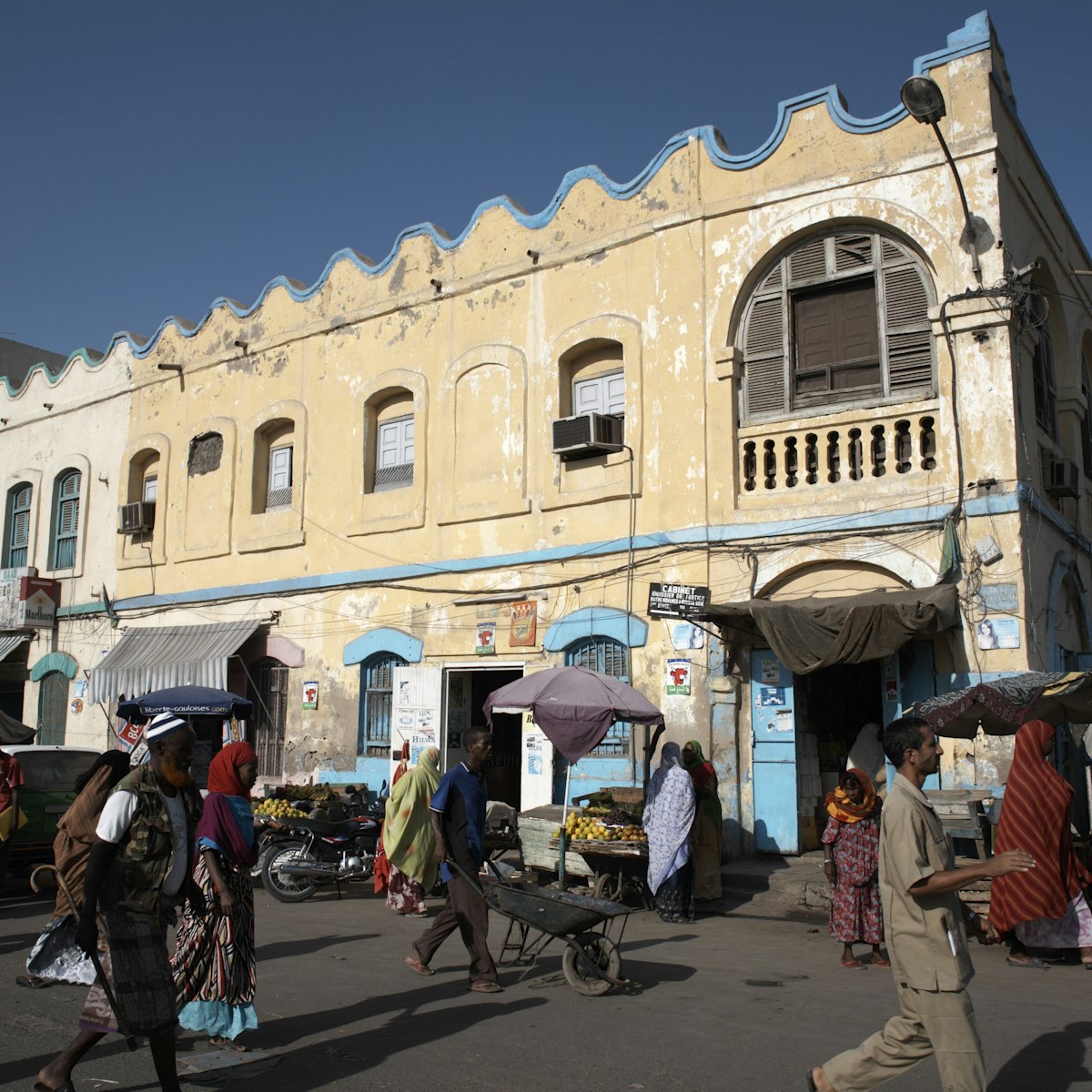
European Quarter
Djibouti City
The focal point of the European Quarter is Place du 27 Juin 1977 (Place Ménélik). With its whitewashed houses and Moorish arcades, this vast square is a…
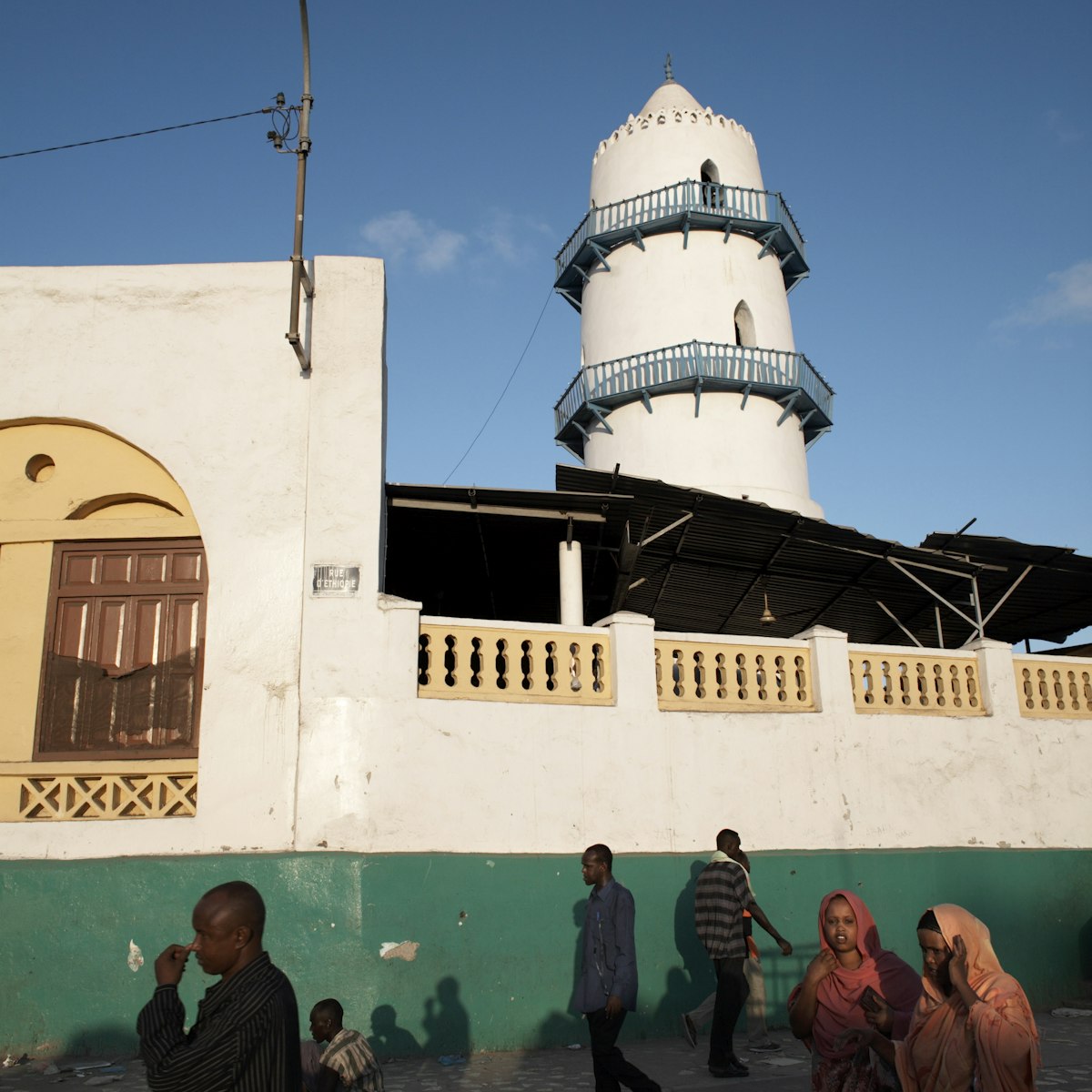
Hamoudi Mosque
The vast and chaotic Place Mahmoud Harbi (Place Rimbaud) is dominated by the minaret of this imposing mosque, Djibouti City’s most iconic building.
African Quarter
The vast Place Mahmoud Harbi (aka Pl Rimbaud), which is dominated by the minaret of the great Hamoudi Mosque, Djibouti City’s most iconic building, is…
In the early evening, the walk along the causeway northwest of the centre makes a very pleasant stroll. The Moorish-inspired presidential palace (not open…
Grand Barra
This spectacular plain of dried and cracked white clay, 27km long and 12km wide, was once an ancient lake. You can't miss it if you're heading to Lac Abbé…
Plateau du Serpent & Îlot du Héron
These adjoining neighbourhoods north of the centre are residential areas where you’ll find many of the foreign embassies and residences, as well as lavish…
Cimetière Marin
The eerily quiet Cimetière Marin (Marine Cemetery), on the western outskirts of town, contains the graves of French soldiers who died from fever on their…
Les Caisses Market
Spreading along Blvd de Bender are the stalls of this popular market. Crammed with every type of souvenir from woodcarvings to clothing, it’s a colourful…
Ras Bir Lighthouse
About 6km east of the centre, this well-kept lighthouse is worth a gander. It’s completely isolated, and there’s an eerie atmosphere.
The cathedral has been recently restored and is one of the most eye-catching buildings along Blvd de la République.
Petit Barra
The road from Djibouti City to Lac Abbé crosses this desert plain, which was once an ancient lake.
Governor’s House
Obock is where French colonialism all began. In 1862, the Afar sultans of Obock sold their land to the French, and construction of the town began. But it…
Église Éthiopienne Orthodoxe Tewahido St Gabriel du Soleil
In a street running parallel to Blvd de la République, this Orthodox church, which is popular with the Ethiopian community, is well worth a peek.
More destinations you need to see
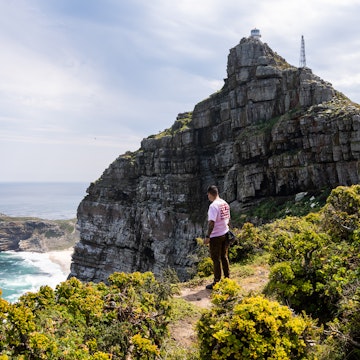
Top Things to Do in Djibouti, Djibouti

Places to Visit in Djibouti
Explore popular experiences, top attractions in djibouti.
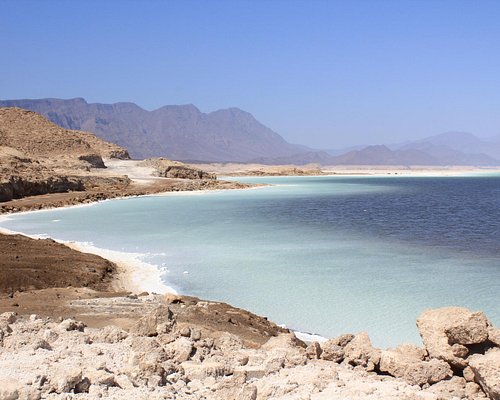
What travellers are saying
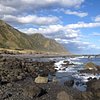
- 2 Other destinations
- 3.1 Climate
- 3.2 Tourist information
- 4.1 Visa requirements
- 4.2 By plane
- 4.4 By train
- 4.6 By boat
- 9.2 Shopping
- 13 Stay safe
- 14 Stay healthy
Djibouti is in the Horn peninsula on the Gulf of Aden. The country can be divided into three regions; the coastal plain and volcanic plateaus in the central and southern parts of the country and the mountain ranges in the north. Much of the country is wasteland with virtually no arable land.
Cities [ edit ]

- 11.595 43.148056 1 Djibouti - the capital and by far the largest city
Towns [ edit ]
Other destinations [ edit ].
- 11.8 42.683333 1 Day Forest National Park — Djibouti's only national park
- 11.724444 43.191667 4 Moucha Island
Understand [ edit ]
Djibouti's location near the Suez Route , one of the world's most busiest shipping routes, has made the country important for international trade.
Climate [ edit ]
Djibouti's climate is very hot, humid and arid, especially in the summer. The summer heat is moderated, however, by a sustained breeze in the coastal city of Djibouti. From October to April, the temperature is cooler, with occasional rain. Cyclones from the Indian Ocean create heavy rains and flash flooding.
Tourist information [ edit ]
- National Tourism Office of Djibouti
Get in [ edit ]
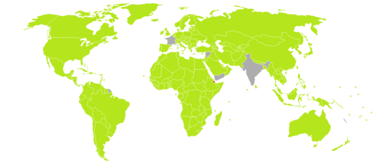
Visa requirements [ edit ]
Most nationals can get a visa on arrival for 15,000 DJF or 90 USD (as of November 2018), valid for one month. Transit visas are valid for 10 days and are available on arrival at the airport to nationals of the European Union, Scandinavian countries and the USA for 10,000 Fdj. If you plan to enter by land you have to arrange for visas in advance. Visas can be obtained from neighbouring countries (e.g. embassy in Addis Ababa makes visa within a day). Where no Djibouti embassy exists, they can often be obtained from the French embassy. The types of visas include: Entry ( visa de séjour ); Tourist ( visa de tourisme ); Business ( visa d’affaires ); and Transit ( visa de transit ). Those travelling on Singaporean passports can get a visa free. It is possible to make e-visa , though there are many reports of rejections and delays without any explanations.
By plane [ edit ]
By car [ edit ].
There are roads from Djibouti to Assab (Eritrea) and going west into Ethiopia via Dikhil. Those using them should be aware that road conditions are generally poor and personal security might be at risk when travelling, particularly to Ethiopia. Visitors are advised to check transit regulations as political conditions in Ethiopia and Eritrea are changeable. There are no formal border posts with Eritrea. Four-wheel-drive vehicles are recommended for the interior. There is a new highway from Djibouti to Tadjoura. Traffic drives on the right. It is advisable to carry water and petrol on any expedition off main routes. An International Driving Permit is recommended, although not legally required. A temporary licence to drive is available from local authorities on presentation of a valid UK driving licence.
By train [ edit ]
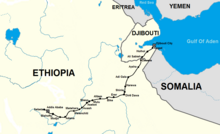
Passenger train services between Ethiopia and Djibouti City were restarted in December 2016. While the line mostly serves as a vital freight link from landlocked Ethiopia to the major port of Djibouti, it also has passenger service. Reportedly passenger trains reach a top speed of 160 km/h (99 mph) and take 12 hours for the more than 700 km (430 mi) long journey from Addis Abeba that used to take three days by road.
By bus [ edit ]

Buses operate from Djibouti to most towns and villages throughout the country. Buses leave when they are full. A minibus service operates in Djibouti, stopping on demand. A fixed-fare system is used.
By boat [ edit ]
There are ferry services connecting Djibouti to Yemen . Djibouti City is one of the main ports of eastern Africa so it's a popular route.
Get around [ edit ]
- Taxis are available in Djibouti and from the airport to the town, as you exit the airport there is a big billboard displaying expected taxi fares, look for it; also in Ali-Sabieh, Dikhil, Dorale and Arta. Fares can increase by 50% after dark.
- Bicycling is a great way to get around the small capital.
- Ferry services sail daily from L'Escale (Djibouti) to Tadjoura and Obock . The journey takes about three hours.
You should avoid driving after dark outside the city of Djibouti. Vehicles do not always have working headlights and there may be livestock on the roads. Extra care must be taken in the occasionally chaotic traffic.
Talk [ edit ]
Although French and Arabic are the official languages, Somali and Afar are widely spoken. English may be spoken at tourist facilities, but is not widely spoken by locals or taxi drivers.
See [ edit ]

- Lake Assal . 150 m below sea level, Lake Assal is the third-lowest point on Earth. You'll need to hire a car or ask someone who lives in Djibouti to drive you there. Expect a rough ride: the roads outside the capital are destroyed by the truck traffic between Djibouti and Ethiopia. The road passes within sight of the Devil's Island, and some impressive views. Expect to be awestruck. ( updated Jul 2016 )
- Lake Abbe is one of the most desolate places on Earth and is dotted with limestone chimneys standing as high of 50 m. It was described as lunar, and Planet of the Apes was filmed here.
Do [ edit ]
- Scuba diving — Despite the country's arid landscape, off the coast lie several reefs teeming with all sorts of life.
- Sea kayaking — Sea kayaking allows you to enjoy the Gulf of Tadjoura and Ghoubet Kharrib in an eco-friendly way, with the possibility of observing whale sharks and sea turtles.
- Whale shark tours — You can also go snorkelling or diving with whale sharks, although the chance of seeing them varies throughout the season (70-80% in Nov-Jan and close to zero during warmer months).
Buy [ edit ]
Money [ edit ].
The currency of Djibouti is the Djiboutian franc , denoted by the symbol " Fdj " (ISO currency code: DJF ). The Djiboutian franc is pegged to the US dollar. You can convert dollars to francs with local street money changers located in the Djiboutian market area. The street money changers are women who line the street waiting to convert foreign currencies to francs. Whilst generally honest brokers it is still advisable to have yours ready and check the exchange rate in advance. Most of them speak basic English.
Coins in Djibouti come in denominations of 1-, 2-, 5-, 10-, 20-, 50-, 100-, 250 and 500 Djiboutian francs. Banknotes in Djibouti come in denominations of 1,000-, 2,000-, 5,000 and 10,000 Djiboutian francs. There is also a 40 Djiboutian franc banknote, but is worth more as a numismatic piece than as a circulating piece.
Shopping [ edit ]
Khat: A leafy stimulant popular with the locals. It is flown into the country each morning from Ethiopia and arrives by truck in Djibouti's Central Market at about 13:00. It is fairly inexpensive, but quality varies greatly, so shop with caution. Khat may not be taken out of Djibouti through the airport, and is illegal to possess in many other countries.
You can purchase general merchandise and food items at the larger department stores using US dollars. The tourist traps will see you coming a mile away and charge ridiculous conversion rates and tourist prices. If you have access to Camp Lemonnier, go to the disbursement office for the best rate.
Eat [ edit ]
The city of Djibouti has many places to eat, including tourist traps. Western food is often expensive cuisine, with local cuisine being much cheaper. For example, the Ethiopian Community Center offers a wide variety of local, tasty and reasonably priced dishes. Average price per meal outside tourist areas is US$4 including drink.
Drink [ edit ]
Sleep [ edit ], stay safe [ edit ].
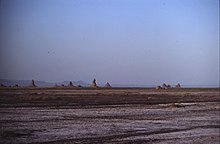
Natural hazards include earthquakes and droughts. Occasional cyclonic disturbances from the Indian Ocean bring heavy rains and flash floods.
Visitors should be aware of the risk of banditry outside the capital city.
Stay healthy [ edit ]
Health insurance is advisable. Doctors and hospitals may expect immediate cash payment for any medical treatment. A yellow fever vaccination certificate is required for visitors over one year of age coming from infected areas. Cholera is also a serious risk and precautions are essential. Up-to-date advice should be sought before deciding if these precautions should include vaccination as medical opinion is divided over its effectiveness. Typhoid immunization is usually advised.
Malaria risk, predominantly in the malignant falciparum form, exists year round. Resistance to chloroquine has been reported. Mefloquine, doxycycline or atovaquone/proguanil are recommended.
The adult HIV/AIDS prevalence rate is over 3% or 1 in 33 adults. Protect yourself.
Tap water is not safe to drink unless it has been boiled or otherwise sterilized.
Respect [ edit ]
Casual wear is widely acceptable, but Djibouti is a Muslim country and certain codes of behaviour should be observed. Shorts are generally not appropriate outside of hotels, beaches or sport activities. While homosexuality is not explicitly criminalized it remains broadly unaccepted, Djibouti is generally considered unsafe for LGBT travelers in all locations.
Connect [ edit ]
There is a 3G phone network in the country that runs on 900MHz. The maximum speed is 7mbps but expect it to be lower. You can get 1GB of data for about US$3. More info can be obtained here
- Has custom banner
- Has map markers
- See listing with no coordinates
- Has warning box
- Outline countries
- Outline articles
- Country articles
- Has Geo parameter
- East Africa
- All destination articles
- Pages with maps
Navigation menu
Djibouti Travel Guide: Essential Facts and Information
:max_bytes(150000):strip_icc():format(webp)/DSC00412-5b73daf7c9e77c0057ca2198.jpg)
Djibouti is a tiny nation sandwiched between Ethiopia and Eritrea in the Horn of Africa. Much of the country remains undeveloped, and as such it's a fantastic destination for eco-tourists looking to get off the beaten track. The interior is dominated by a kaleidoscope of extreme landscapes ranging from plunging canyons to salt-encrusted lakes; while the coast offers excellent scuba diving and the opportunity to snorkel alongside the world's largest fish . The country's capital, Djibouti City, is an urban playground on the rise with one of the region's finest culinary scenes.
Djibouti is part of East Africa . It shares borders with Eritrea (to the north), Ethiopia (to the west and south) and Somalia (to the south). Its coastline borders the Red Sea and the Gulf of Aden.
Djibouti is one of the smallest countries in Africa, with a total area of 8,880 square miles/ 23,200 square kilometers. In comparison, it is slightly smaller than the American state of New Jersey.
Capital City:
The capital of Djibouti is Djibouti City.
Population:
According to the CIA World Factbook, Djibouti's July 2016 population was estimated at 846,687. More than 90% of Djiboutis are under 55 years of age, while the country's average life expectancy is 63.
French and Arabic are the official languages of Djibouti; however, the majority of the population speaks either Somali or Afar as their first language.
Islam is the most widely practiced religion in Djibouti, accounting for 94% of the populace. The remaining 6% practice various denominations of Christianity.
Djibouti's currency is the Djiboutian franc. For up-to-date exchange rates, use this online currency converter .
Djibouti's climate is hot all year round, with temperatures in Djibouti City rarely falling below 68°F/ 20°C even in winter (December - February). Along the coast and in the north, the winter months can also be quite humid. In summer (June - August), temperatures often exceed 104°F/ 40°C, and visibility is reduced by the khamsin , a dust-laden wind that blows in from the desert. Rains are rare, but can be briefly intense especially in the central and southern interior.
When to Go:
The best time to visit is during the winter months (December - February), when the heat is at its most bearable but there is still plenty of sunshine. October - February is the best time to travel if you're planning on swimming with Djibouti's famous whale sharks .
Key Attractions
Djibouti City
Founded in 1888 as the capital of the French Somaliland colony, Djibouti City has transformed over the years into a thriving urban center. Its eclectic restaurant and bar scene matches its identity as the second richest city in the Horn of Africa. It is highly cosmopolitan, with elements of traditional Somali and Afar culture blending with those borrowed from its significant international community.
Also known as Lac Assal, this magnificent crater lake is located 70 miles/ 115 kilometers west of the capital. At 508 feet/ 155 meters below sea level, it is the lowest point in Africa. It is also a place of great natural beauty, its turquoise waters contrasting with the white salt banked along its shore. Here, you can watch Djiboutis and their camels harvesting the salt as they have done for hundreds of years.
Moucha & Maskali Islands
In the Gulf of Tadjoura, the islands of Moucha and Maskali offer excellent beaches and abundant coral reefs. Snorkelling, diving and deep sea fishing are all popular pastimes here; however, the main attraction occurs between October and February when the islands are visited by migrating whale sharks. Snorkelling alongside the world's largest fish is a definite Djibouti highlight.
Goda Mountains
In the northwest, the Goda Mountains offer an antidote to the arid landscapes of the rest of the country. Here, vegetation grows thick and lush on the shoulders of mountains that reach up to 5,740 feet/ 1,750 meters in height. Rural Afar villages offer a glimpse of Djibouti's traditional culture while the Day Forest National Park is an excellent choice for birding and wildlife enthusiasts.
Getting There
Djibouti–Ambouli International Airport is the main port of entry for most overseas visitors. It is located approximately 3.5 miles/ 6 kilometers from the center of Djibouti City. Ethiopian Airlines, Turkish Airlines and Kenya Airways are the biggest carriers for this airport. It is also possible to take a train to Djibouti from the Ethiopian cities of Addis Ababa and Dire Dawa. All foreign visitors need a visa to enter the country, although some nationalities (including U.S.) can purchase a visa on arrival. Check this website or consult your nearest embassy for further information.
Medical Requirements
In addition to ensuring that your routine vaccines are up to date, it is recommended to vaccinate against Hepatitis A and Typhoid before traveling to Djibouti. Anti- malaria medication is also required, while those traveling from a yellow fever country will need to provide proof of vaccination before being allowed into the country. Check the Centers for Disease Control and Prevention website for further details.
The Top 12 Things to Do in Ethiopia
Gabon Travel Guide: Essential Facts and Information
Cape Verde: Facts and Information
Madagascar Travel Guide: Essential Facts and Information
Africa's Best Destinations for Swimming With Whale Sharks
DRC Travel Guide: Essential Facts and Information
Kenya Travel Guide: Essential Facts and Information
Seychelles Travel Guide
Mauritius Travel Guide: Essential Facts and Information
Senegal Travel Guide: Essential Facts and Information
Your Trip to Rwanda: The Complete Guide
Nigeria Travel Guide: Essential Facts and Information
Ghana Travel Guide: Essential Facts and Information
2020 Travel Warnings for Countries in Africa
Equatorial Guinea Travel Guide: Essential Information
22 Fun Facts About Africa
- Countries visited: 115
- Currently in : Singapore 🇸🇬
- Partner with us
- SOLO FEMALE TRAVELERS COMMUNITY
Disclaimer: This page may contain affiliate links. Please see our disclaimer policy here . Never leave without travel insurance .
Things to do in Djibouti and a 4 day itinerary
This post was first written in 2015 and updated in 2018.
Looking for things to do in Djibouti but don’t know where to start? Tourism in Djibouti is scarce but the country has so many tourist attractions it is a shame not more people visit. Let me help you plan your trip with this guide which also includes a 4 day itinerary and a list of all the attractions in Djibouti that you cannot miss. Ready to discover this much unknown country featured in the Least Visited Countries in the World ? Follow me for an awesome trip to the Horn of Africa and get that super rare passport stamp .
Where is Djibouti
When I mention Djibouti as one of my most favorite places the usual answer I get is, “where is Djibouti?”
Most people cannot locate it on a map, they can’t even tell what continent it is in. So let’s start there.
Djibouti is located in the Horn of Africa, sandwiched between Ethiopia, Somaliland and Eritrea and facing the Gulf of Aden. Below is a map of Djibouti showing where it is.
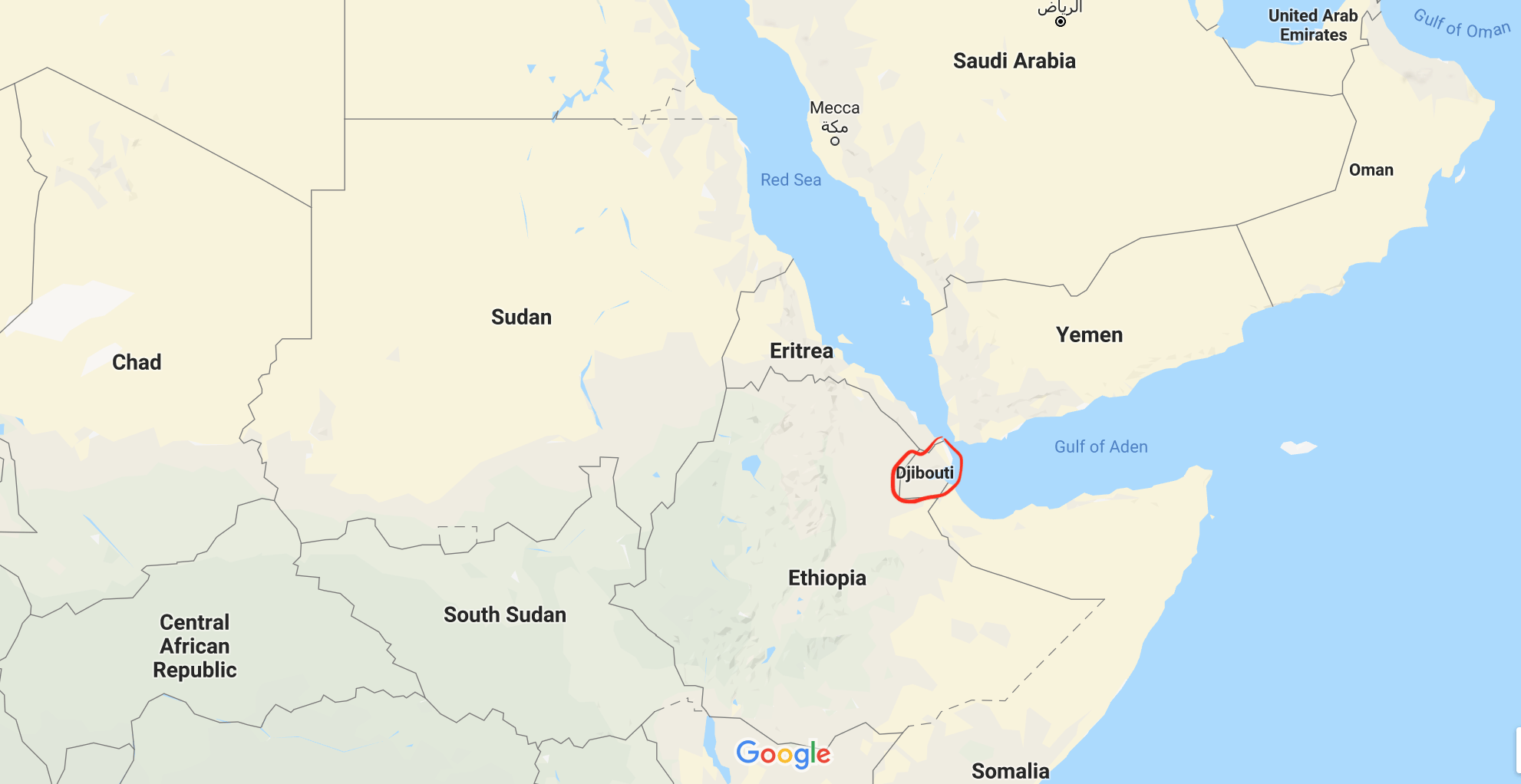
The most remarkable part of Djibouti’s past is its French colonial times which left an imprint in the country and its language. If you speak French, you will be in luck as English is not widely spoken. The French acquired the colony then named French Somalia, as a strategic point of passage via the Suez Canal and through an agreement signed by the Issa Somali and the Afar Sultans who inhabited the area.
Djibouti was a french colony from the 19th century until 1977 when the country voted for independence after having voted no to joining Somalia. Independence was finally granted after several referendums. Every time, the Issa Somali would vote for independence with the final intent of joining Somali and the Afar would vote to say with France.
Civil War ensured independence when the party in government declared it was the sole legal government party. Peace was finally signed in 1994.
Since 2001, Djibouti has become a safe and secure military base for most powers, especially for the US and its Camp Lemonnier , a United States Naval Expeditionary Base and the country’s only permanent base in Africa. Japan also opened a base around the same time. There is military presence from several other countries like Sweden, Germany and Spain.
Check out my post on Fun facts about Djibouti for a few more fascinating things about the country.
Things to do in Djibouti
Djibouti is a very small country but the roads are limited so you may find yourself driving cross-country on the desert sand following a GPS or relying on your driver’s sixth sense. Tourism in Djibouti is definitively of the adventure type.
But before we set off, here’s a map of Djibouti with all the main tourist sites and places of interest marked. There are not really a lot of cities in Djibouti so the map does not have a lot of names marked.
Explore the Capital of Djibouti, Djibouti City
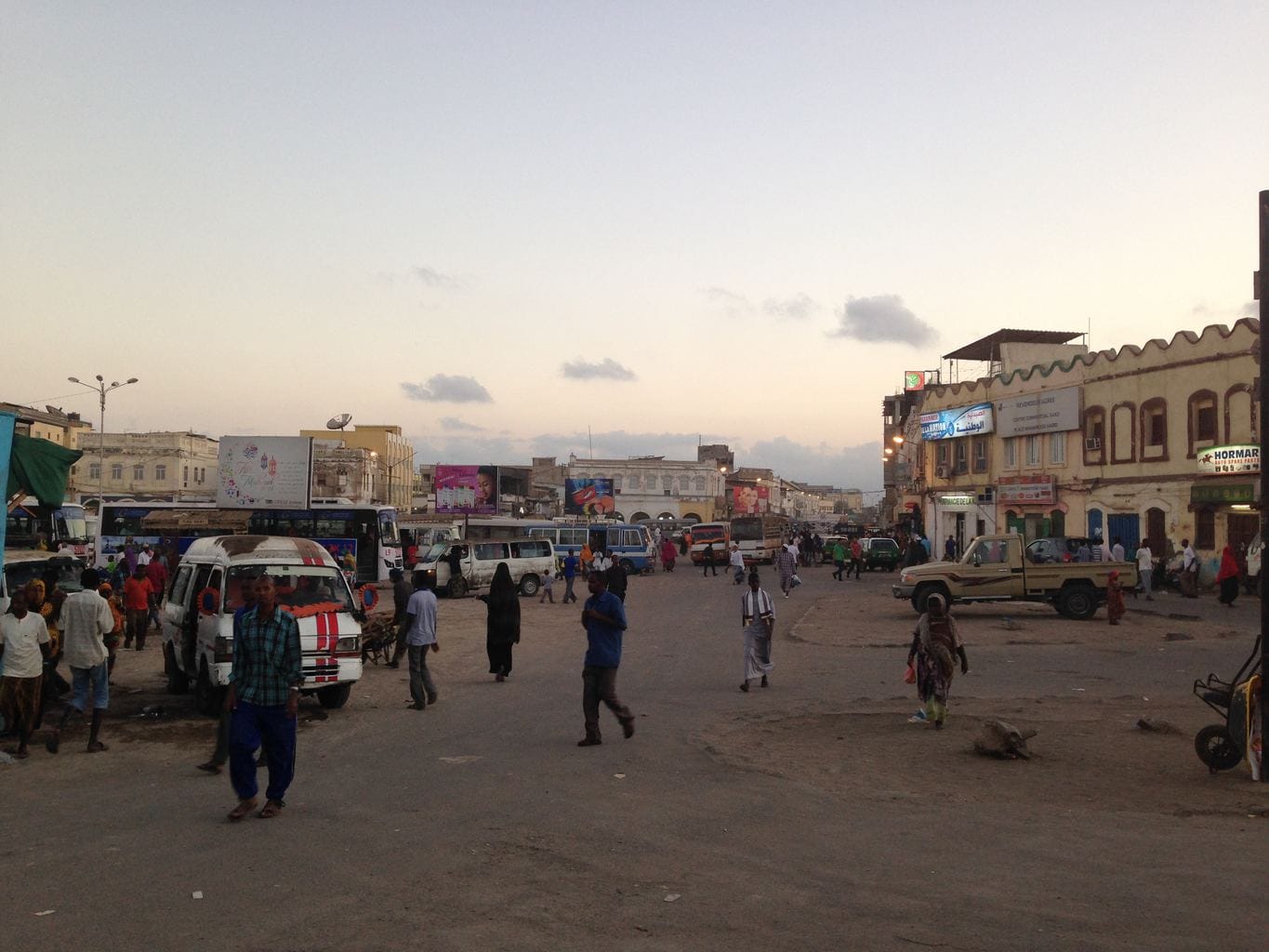
One of the best things to do in Djibouti is exploring the capital of the same name. The city is not large and it may take you at most an hour to walk all the interesting quarters. You should visit the European and the Arab quarters both of which are adjacent.
The city’s European Quarter is a mix of French colonialism and moorish architecture and it is one of Djibouti’s landmark area. Expect to feel like at a run-down version of Morocco. Buildings are colorful and would have been stunning at their time but they look forgotten. I felt similarly to when in Cuba.
People sit on the streets, chat, enjoy tea, chew qat and simply see the world go by. Streets are narrow and there is little motorized traffic. Life seems to go by slowly in this part of town. There are a variety of stores open selling all sorts of items, don’t expect any international brand.
If you follow the noise of the traffic you will eventually reach Place Mahmoud Harbi or Place Rimbaud where the city’s most iconic building, and Djibouti’s most important landmark is: the mosque. The sound of the call to prayer is also a good reference to follow if you are wandering the streets at that time. The large square looks more like a combination of a bus station and an open market. It is the border between the European and the African Quarters.
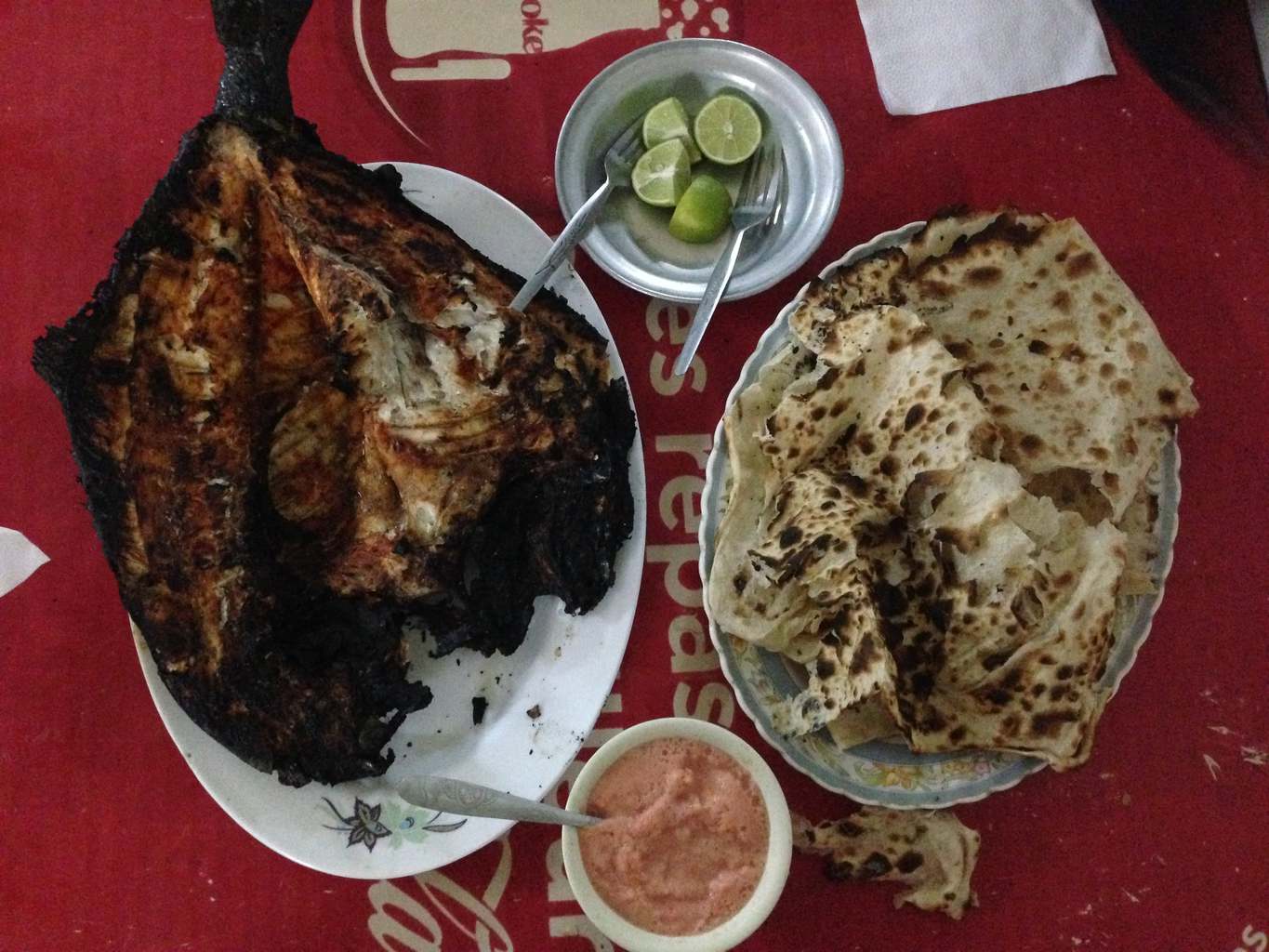
The African Quarter is a large sprawl of tin-roofed huts lined up on barren and chaotic streets. Goats and children room freely in equal measure and the streets have barely any public lighting relying instead on the light in people’s homes.
The streets used to be paved but have now been covered by layer after layer of dust and you can no longer see the pavement. I found an old photo from a few decades before that showed how the square and the quarter used to look and it gave a good idea as to the level of abandonment. The nature of the desert had taken over.
Alie Sabieh
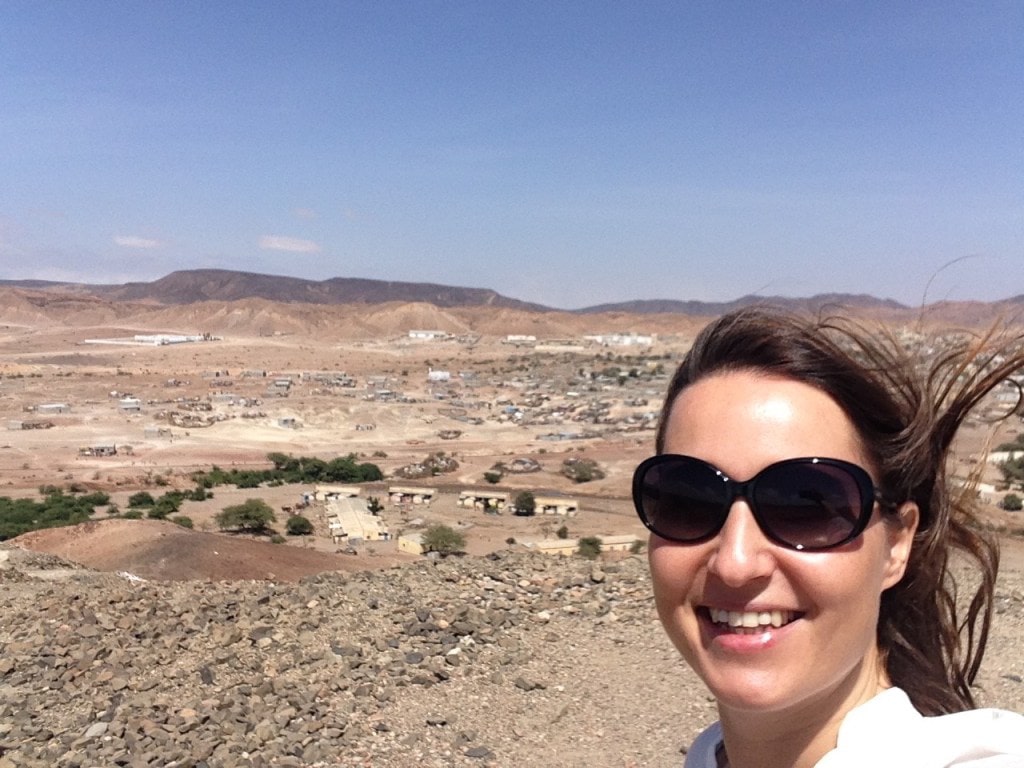
Ali Sabieh is a town half way from Djibouti to Lake Abbe so it makes for a good lunch spot. The town has has one of the largest Qat markets in Djibouti and is the last pit stop to buy water or any other provisions. If you ever wanted to get up and close to qat or even buy some, this is the place. But I warn you, it is pretty disgusting.
This is a relatively solid town, the country’s second largest, with a few facilities, schools and the main railway station. Years ago, the railway used to connect Addis Ababa with Djibouti. I was told that the government stopped fixing the rails and trains because this way there is a local thriving business to transport everything by truck into port. However, trains have started to run again and one can travel from Addis Ababa to Djibouti by rail.
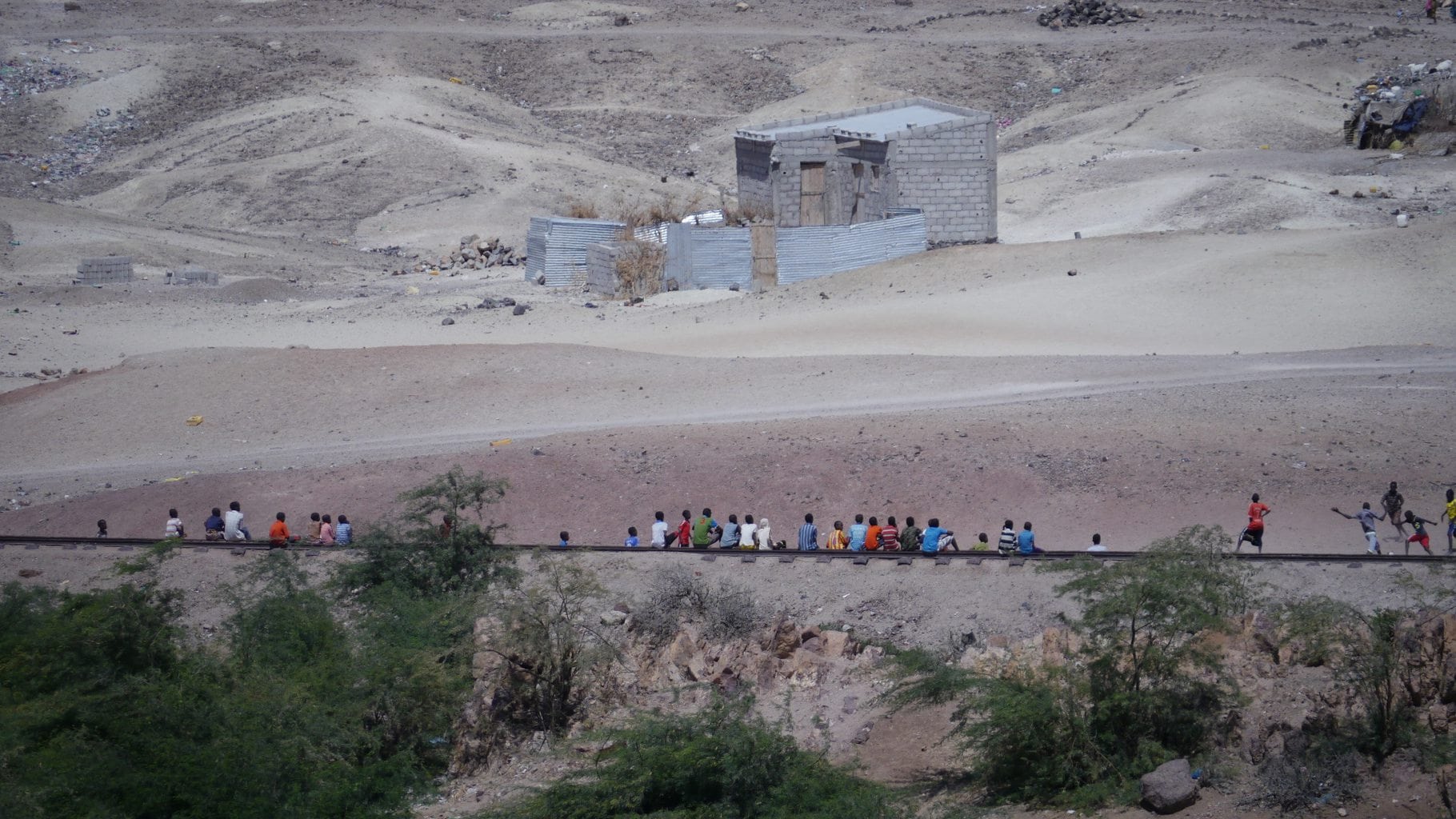
Ali Sabieh is remarkably run-down with the dusty, grey-brown-red colors of this part of Africa dominating the landscapes. It has its own charm if you look closely but I could not imagine spending any time here.
There is a refugee camp manned by the UN and a few NGOs. The sun is unforgiving without any shade to protect yourself from. From up the hill where the telecoms tower is you will get sweeping views of the entire area as far as the eye can see. By the railway, local kids play football using the rails as seats. I see a few Barca t-shirts around. Look up the mountain for the emblem of Djibouti carved on its face.
Moucha Island
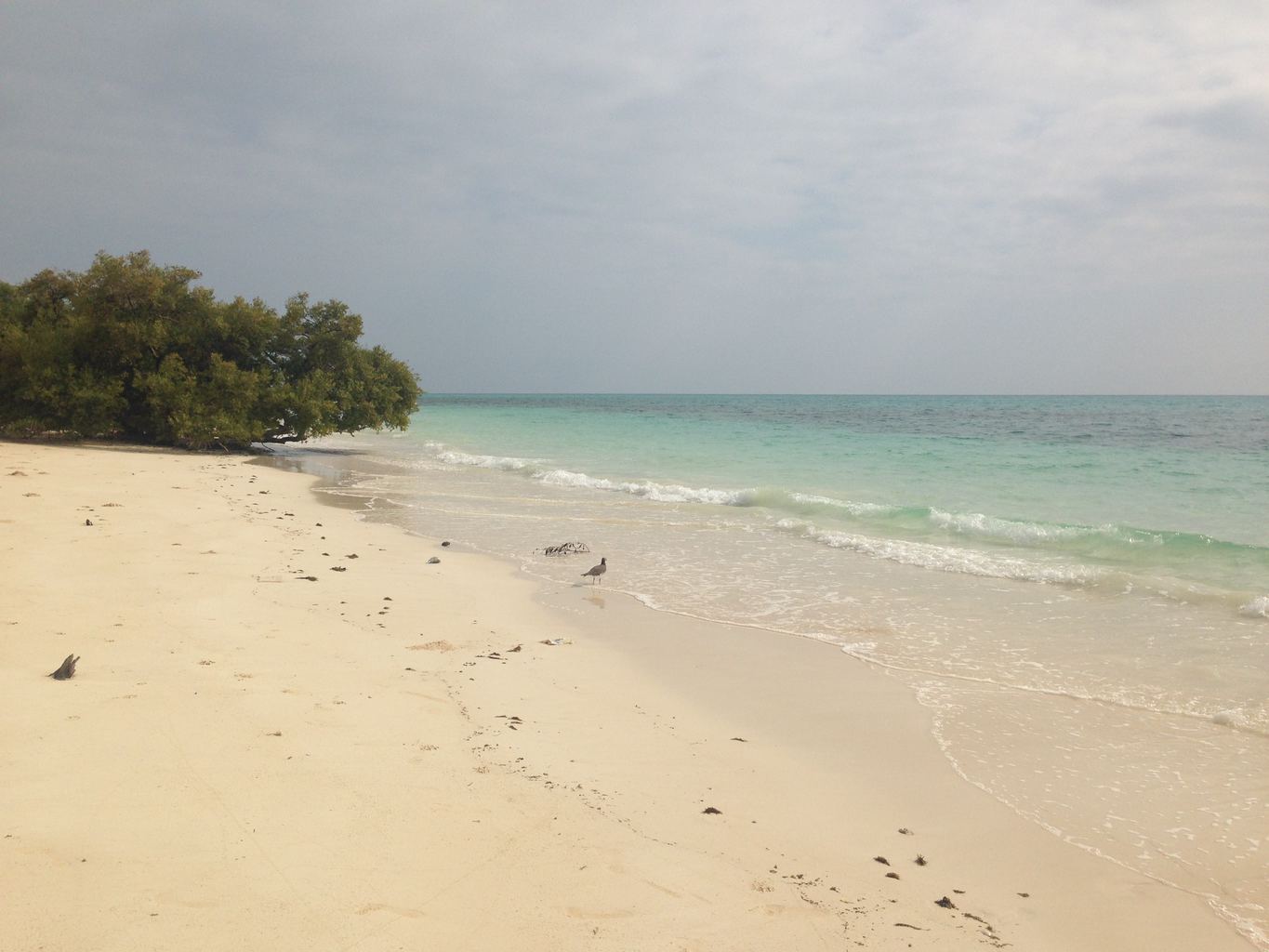
Only a 30min ride on relatively calm waters, this coral islands on the Gulf of Tadjoura provides a relatively quiet beach with limited facilities, people and plenty of turquoise water. There are officially only 20 inhabitants but locals are known to come visit in the summer months.
An Ethiopian company is building a beach club on the island which may attract some visitors. On the day I was there, we saw a few Asian tourists disembark from a boat and leave shortly after. Walk across the island on crusty sand that looks like it has been baked in the oven. Be sure to wear shoes, the sand will get extremely hot very early in the morning. On one side of the island you can sail through mangroves on your motorboat.
Tour the island to the Beach Resort on the other side and you can relax on the sun beds and umbrellas. Most likely you will have it all to yourself. If you see a relatively larger sail boat it may be that of Spanish national, Vincent, the only live aboard dive boat in the country.
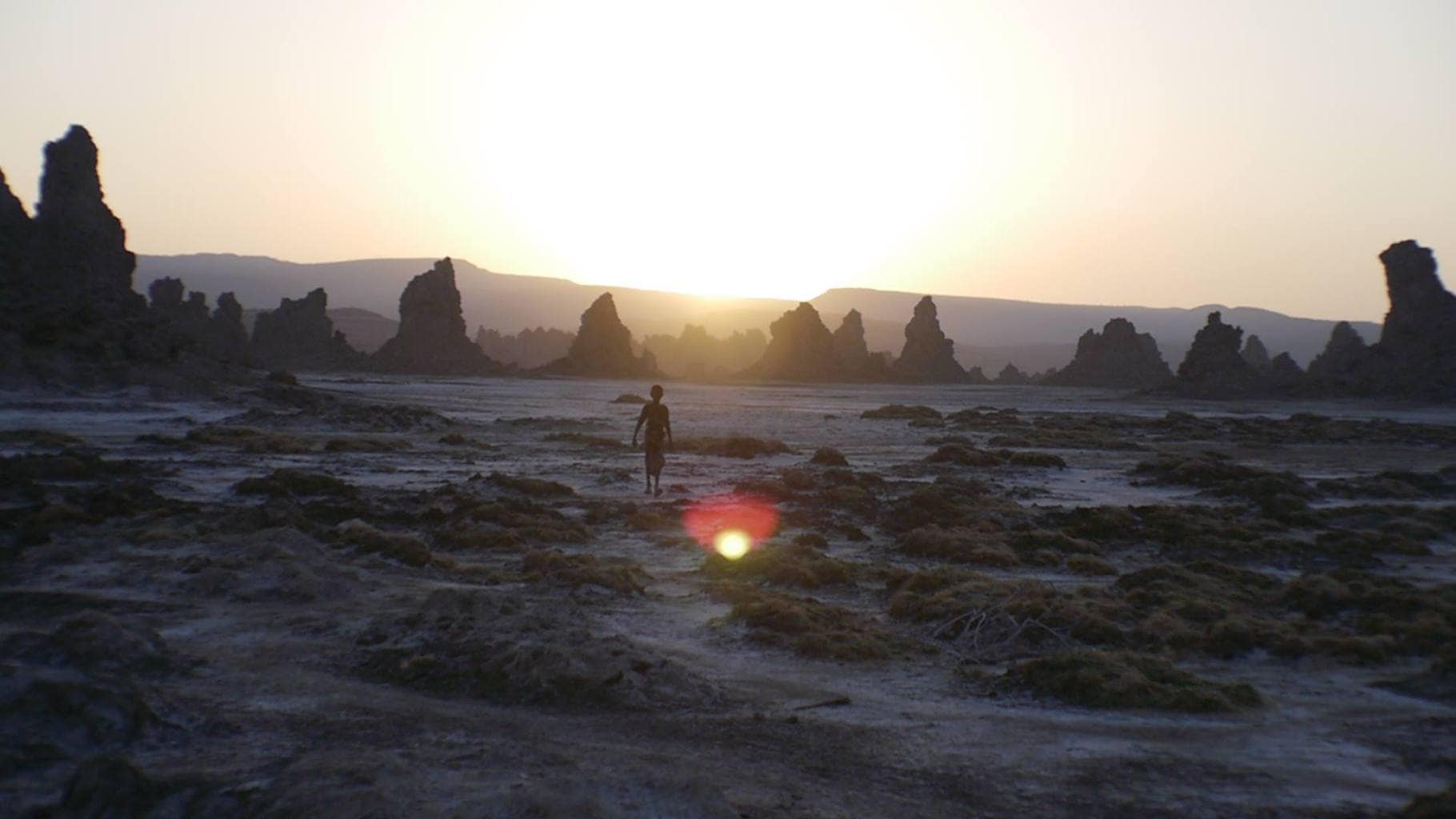
Lake Abbe is a salt lake at the confluence of three Earth crusts pulling away. It is fed by the Awash River and surrounded by extinct volcanoes and depressions. Geologically speaking, it is a marvel and the set of the creation of a new ocean. The three plates pulling apart have created a thin crust that will eventually break and separate the Horn of Africa into its own island. Lake Abbe is part of this and is connected to other 5 lakes. It is a fascinating story.
The most recognisable elements of the Lake Abbe are the chimneys which were created when the Ethiopian government decided to build a damn which slowly drain the lake on their side. Without the water, the mangroves were covered by limestone and bacteria. The steam coming out of the chimneys comes from the underground hot springs.
The bacteria that inhabit the lake have helped grow a steady population of worms, which attract pink flamingos. In the early morning, just after sunrise, we walk for an hour through the slippery mud and the quick sands to reach the lakeshore and observe these elegant creatures.
Read more about in my in-depth review of Lake Abbe
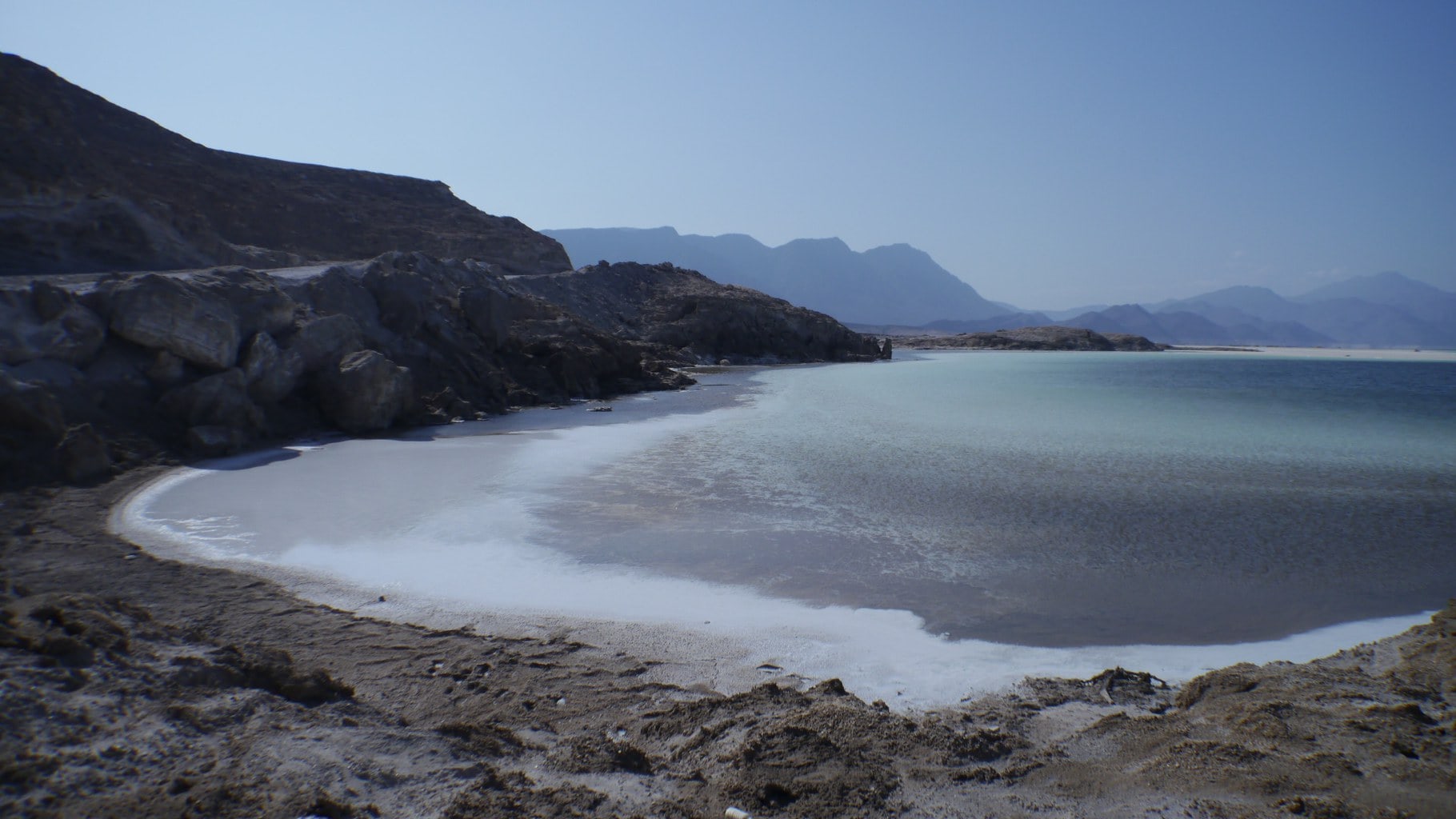
Lake Assal is the saltiest lake outside of Antarctica. Temperatures are extremely high with maximums regularly above the 40 Celsius mark. With this heat, the water would have evaporated but the lake is constantly being replenished by underground streams. You can read more about my visit to Lake Assal here .
The lake has all the colors from green, to brown, black, blue and white made of all the chemicals and particulates in the water.
No matter how isolated and detached from civilization this part of the world is, stalls with goods for sale are still available. You will be able to buy items made of salt including goats head bones covered in salt or just Djibouti salt for cooking.
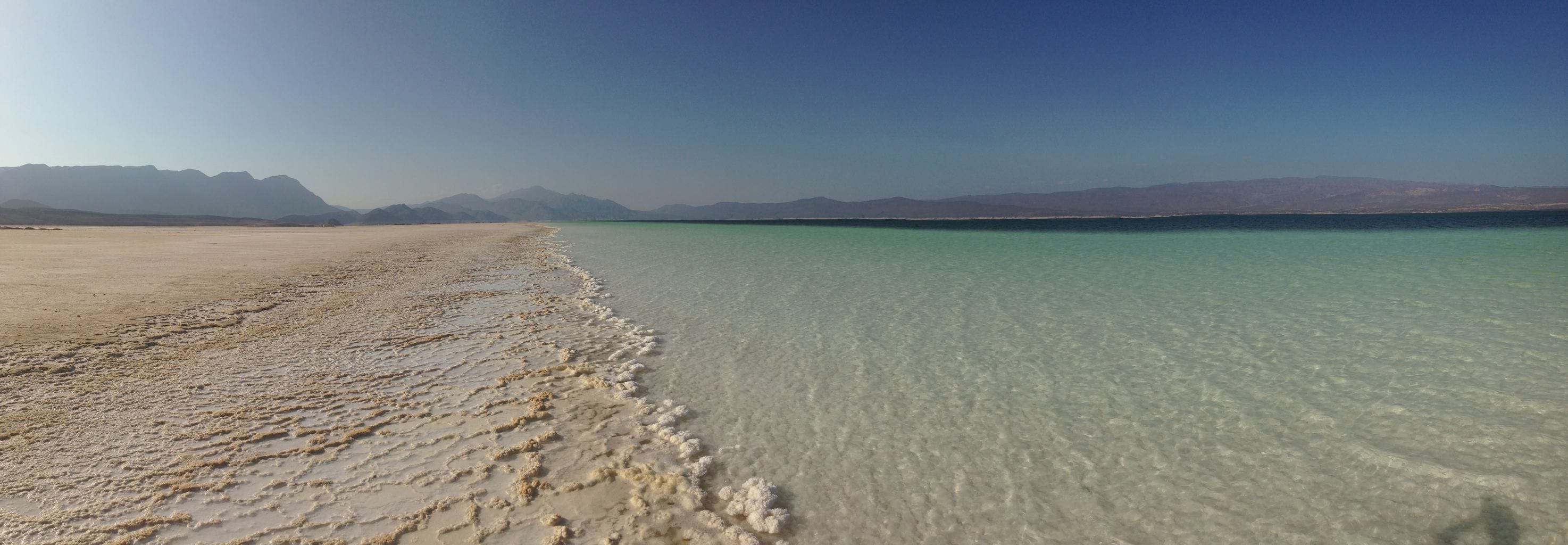
Djibouti’s Whale shark diving
If you come to Djibouti between mid-October and February, you will be able to swim with whale sharks on scheduled trips on Friday and Saturday. Check out this video from a CNN Inside Africa program. Try Dolphin Services .
Whale sharks can only be found in some parts of the world and are seasonally spotted when they come to the warmer waters to breed, but are otherwise found in colder waters away from humans. Swimming with them is an exhilarating experience and one of the most incredible wildlife encounters , much like jumping in the open waters of Tonga to swim with humpback whales .
Swimming with whale sharks in Djibouti happens in the open water around 2h drive from Djibouti and you may take breaks between swims to have a picnic on the sand before going back in to try your luck. While finding whale sharks is not guaranteed, you have a good chance of spotting them and swimming with whale sharks in Djibouti is probably a much more peaceful experience as tourism in Djibouti is underdeveloped.
Give khat a try
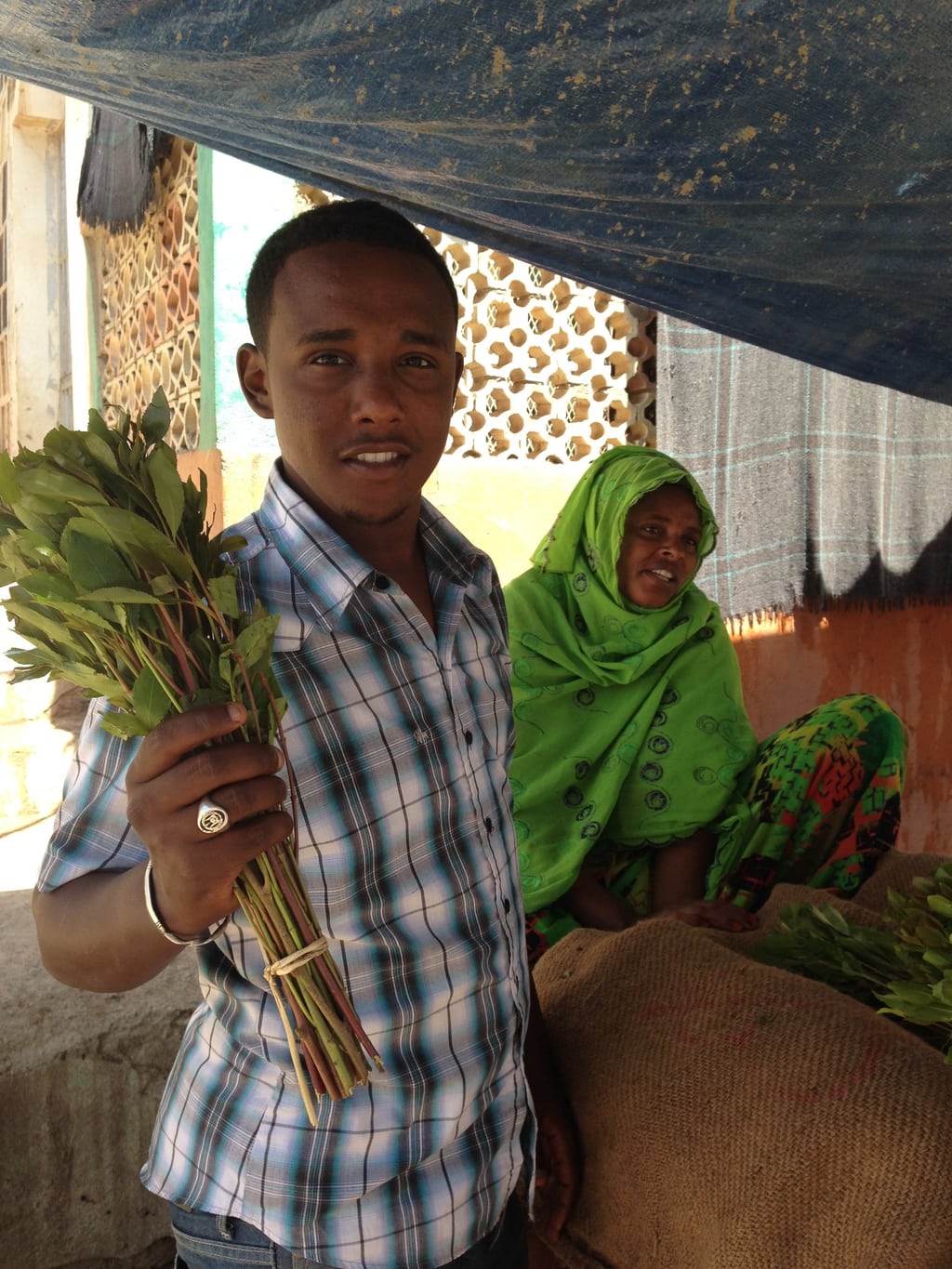
If you have been to the Yemen you will already have heard about khat, also spelled qat. This plant is chewed there as much as it is chewed in Djibouti, Somalia and some parts of Ethiopia. In Yemen, it is pervasive and life pretty much stops in the afternoon when everybody is mildly high on the effects of khat.
Khat contains an amphetamine component that is made of cause euphoria, loss of appetite and excitement. The plant is banned in most countries and is considered a drug since the World Health Organisation classified it as a drug of abuse in 1980.
While it may be less obvious in Djibouti city, you will have no troubles finding khat in the towns, where the vendors will have stacks of the bright green leafy plant on their wooden stalls and locals will chew it nonstop from after lunch till late at night. The plant is chewed while green and has a truly horrible taste in my opinion 🙂
Try Yemeni fish
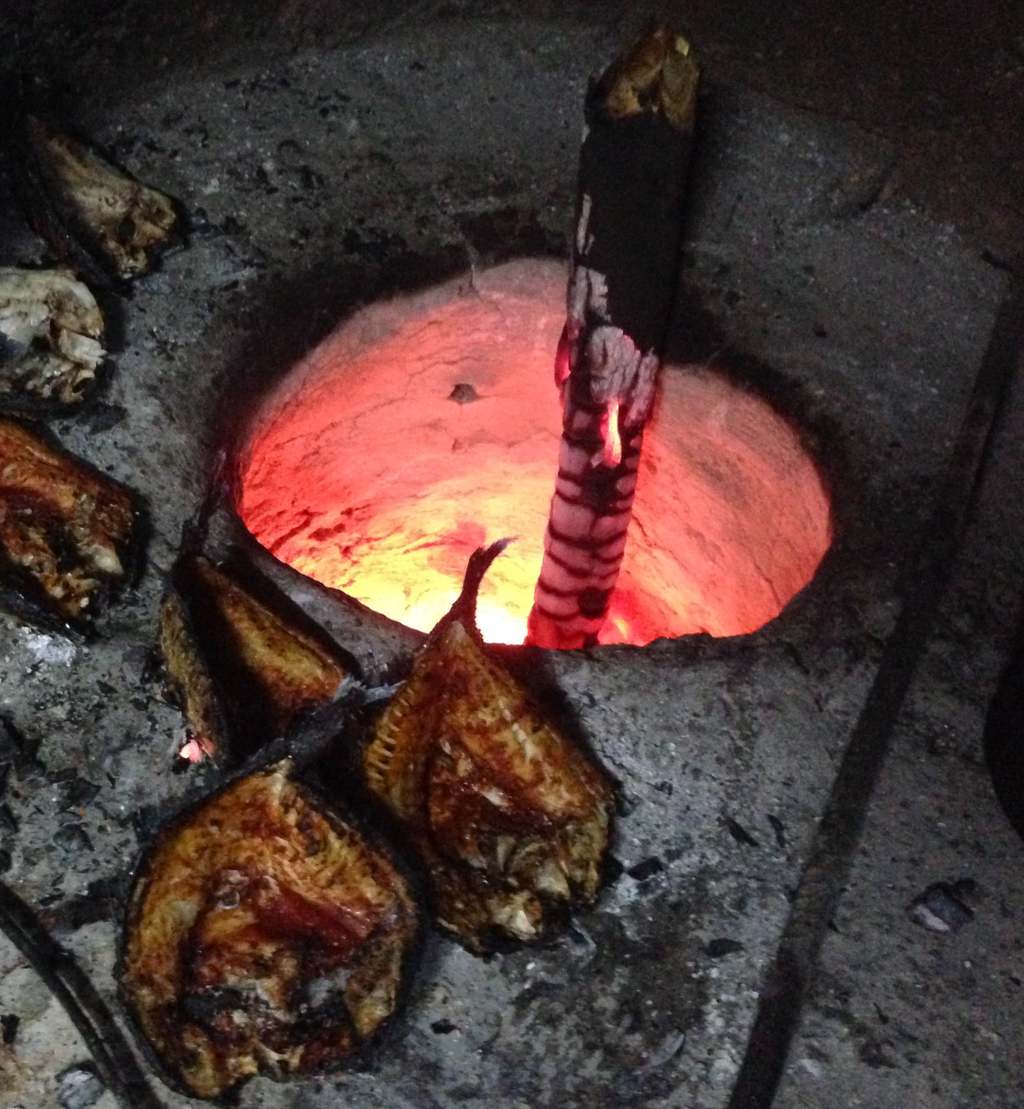
Strange but one of Djibouti’s best and most famous food hails from Yemen and is a whole fish open up, marinated with spices, flattened up and cooked in a tandoori oven, Indian-style. Here you can see the influences that through the years have left a mark on the country.
The fish is delicious and usually served with a side of spicy tomato sauce to dip it in as it can be quite dry and of course bread which is also conveniently cooked on the tandoor.
Chat with the Western armies
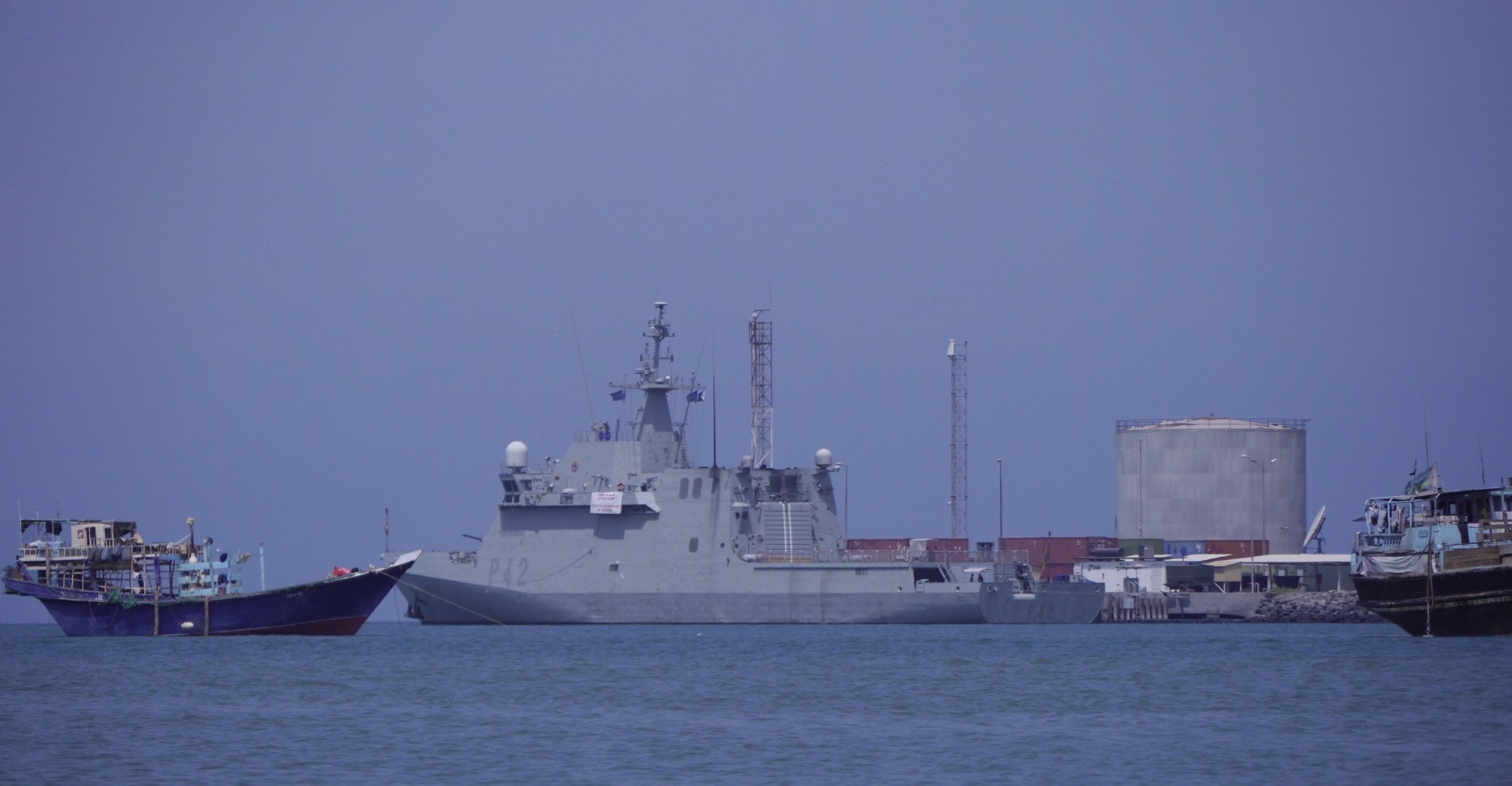
Djibouti is the major army base in Africa for many of the European countries, the US and Japan. While the US has its own separate and inaccessible base and so does the Japanese, most of the personnel from the European armies deployed in the area are actually staying at the luxury hotels.
One of the most interesting things to do in Djibouti is to have a chat with some of them. They are easy to spot and might welcome a chat with some new people. I found it quite funny that the local brand of yogurt in Spain was available at the Kempinski wehre Spanish renoated through the corridors.
Conversely, you might find them to be far less friendly if you try to approach any of the vessels in the port on your way to Moucha Island. We were escorted by a speedboat filled with heavily armed military personnel as we left the port because one of the military vessels from the Spanish army was anchored in port and we came too close to it.
Have a walk around the local port in Djibouti
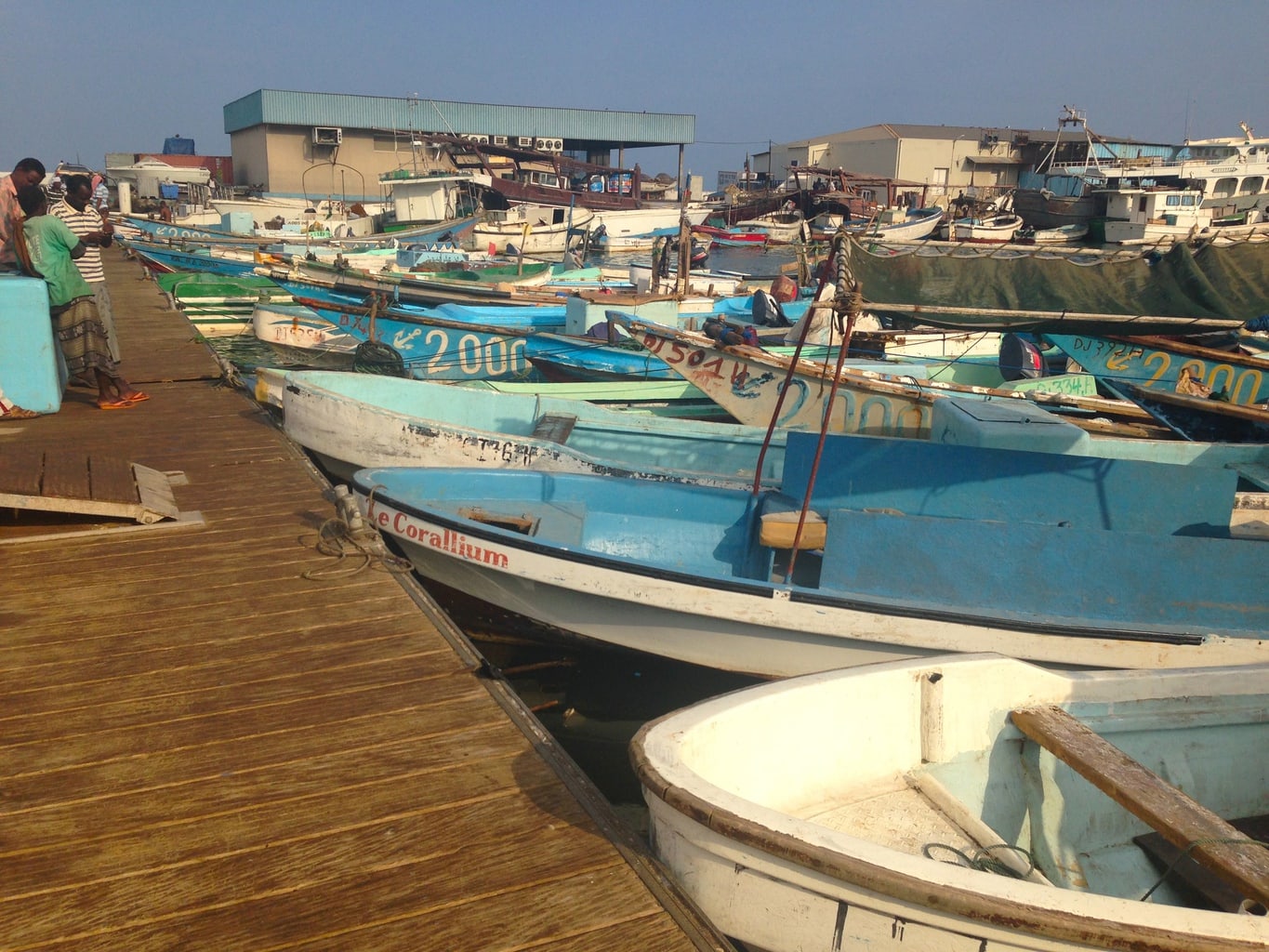
Djibouti is slated to become a major port in the area. It already is and Chinese investment is only expanding it further. However, the local port where the fishermen have their boats, is a completely different story and provides a genuine and authentic look into local life. This is not a tourist attraction per se or one of the most famous things to do in Djibouti but, in my opinion, it was one of the most interesting visits, despite it wasn’t actually an official part of our sightseeing tour of Djibouti but the embarkation point for out excursion to Moucha Island.
It is also rumoured that these fishermen, heavily armed with weapons, are the actual Somali pirates that frighten entire countries. Perhaps an urban legend made up by our guide.
Visit Djibouti’s grand canyon
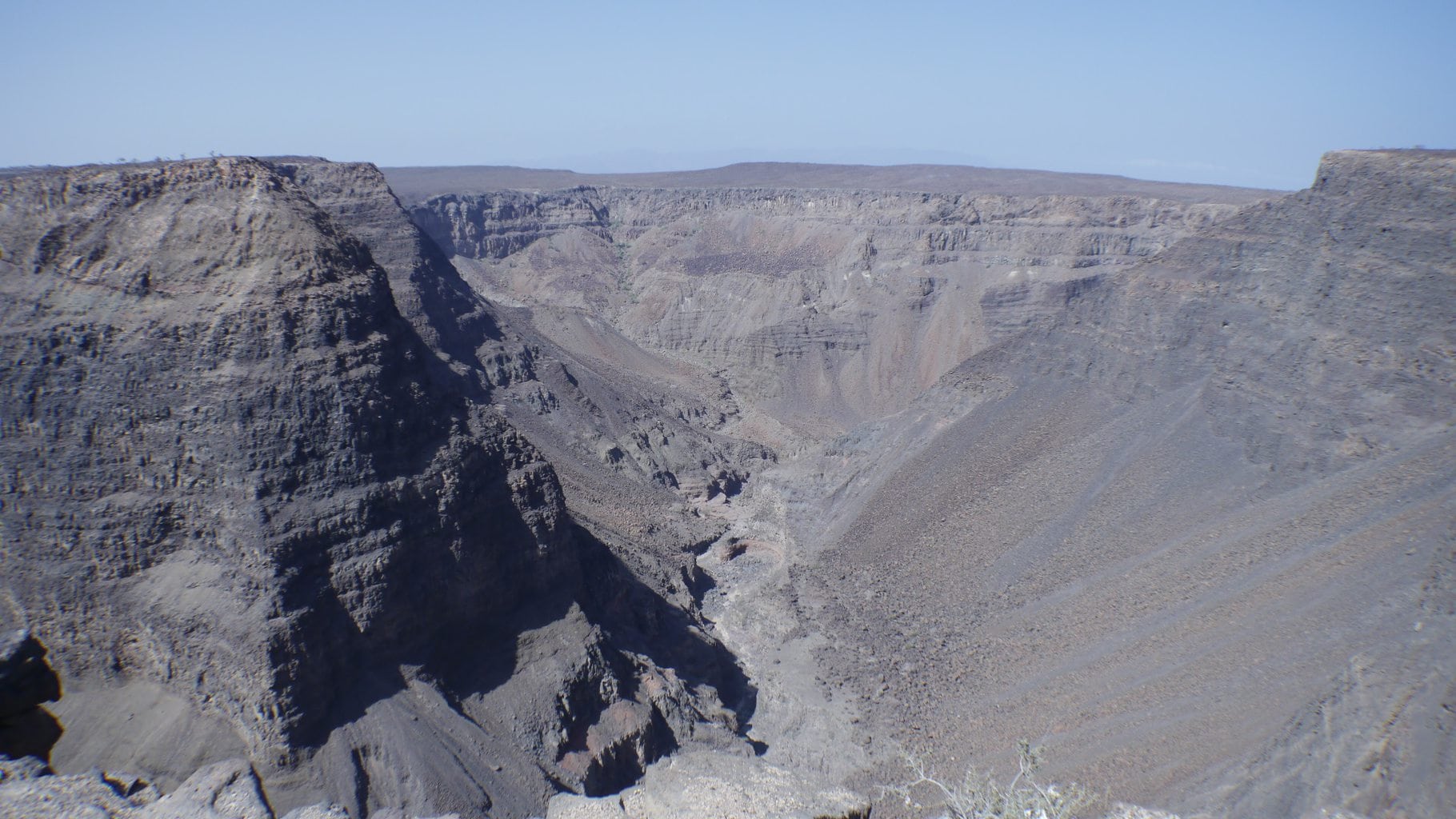
On your way lo Lake Abbe you are likely going to stop for a lookout point into the local version of the grand canyon. I was quite impressed to see it, and although we only could take a look from above, it was quite a stunning landscape, completely barren and rocky, made of the same grey, burgundy and brown of the earth in Djibouti.
Abourma rock art site and Petroglyphs
Djibouti has a recently discovered rock art site which is only accessible on foot and has rock art from Neolithic time. The site is included in the tentative list of UNESCO sites and extends over an area of three kilometres in the rocky mountains of the north of Djibouti. You will need a guide and a 4×4 to access it and should hire one form the local village of Randa, nearby, because that is where most of the local staff helping the French who discovered the site are from.
How long should you spend in Djibouti
Despite there are a few airlines landing in Djibouti, there aren’t daily connections from Dubai so the airline schedules and connections from your base are likely to determine how long you will be spending in Djibouti. Spending 4 days in Djibouti makes a lot of sense and is the choice for most travelers, reason why this guide to visiting Djibouti is laid-out for this trip duration.
Although you may think that 4 days is a short period of time to spend in Djibouti, it is enough to get a good feel for the country. If you had longer, say a week, you could also visit the national parks or go diving if you come in the right season for the whale sharks, but otherwise, 4 days is enough time spent in Djibouti to see the all-year-round sights, experience the very surreal capital, visit Moucha Island and see Lake Assal and Lake Abbe , both of which are incredible natural sights.
4 Day itinerary of Djibouti
When planning what to do in Djibouti, you will need some organisation to make sure you can get to the main sites as they are all pretty far from the capital city. So I put together this 4 day itinerary with all the main things to do in Djibouti well planned.
To make the trip happen, you will also need to use a travel agent as traveling independently in Djibouti is practically impossible. I used Bambu Travel and had no issues. Daniel, the owner, even came with us in the car and provided some more insights into the local culture which was interesting.
The company has got some bad reviews on TripAdvisor and alike and I have heard of more than one traveler having bad experiences but the truth is that you are going to a very remote place with very basic infrastructure at times. The company may not be the best but it is probably how things are done. I also did not manage to find an alternative company that was highly recommended by everyone either, it seems they all have their downfalls.
Day 1: Djibouti city
Since most airlines land in the middle of the day you should spend the first night in the capital. This gives you the chance to wander the streets and take in the culture. There are very few sights to tick off but what makes Djibouti city interesting is watching the people, the places and taking it all in. The cultural shock is guaranteed. See my list of things to see in Djibouti City above and spend your first day covering that.
After you have had enough or it is too dark to see where you are walking settle for dinner at Chef Youssuf, you are likely to walk past this local institution known for the Yemeni fish, a dish you have to try. If you can’t find it, Google it, and follow the instructions, we managed to get there like that. Or just ask.
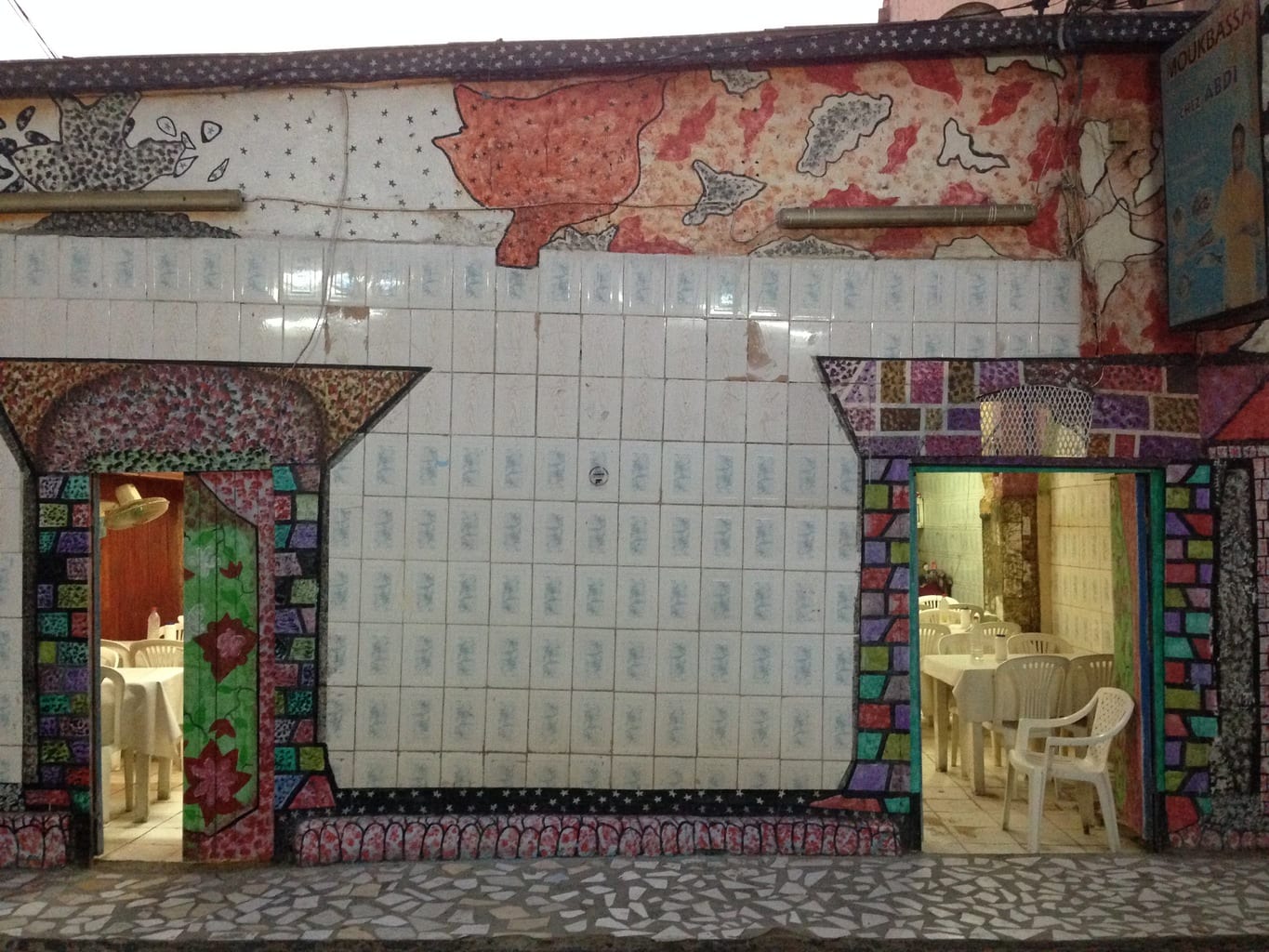
Inside, plastic chairs and corrugated iron walls like the rest of the quarter are the norm. Expect friendly service, even despite the language difficulty. If you speak French you will be in luck. Get the fish, only one because you will get the whole piece and they are large enough to share. The fish is served with a tomato and red pepper refreshing sauce that looks like a mousse and large pieces of fabulous flat bread. Such a simple dish but so well prepared in the tandori oven. Take a peek inside the kitchen, the chef will be happy to show you. To finish off, get one of the pervasive Nutella crepes made with the same bread, they are more a cilinder of rolled up chocolate happiness.
Grabbing a taxi back to your hotel should not be difficult. Just retrace your steps back to the main square and there will be enough traffic to find one. Follow the light.
Day 2 – Desert and Lake Abbe
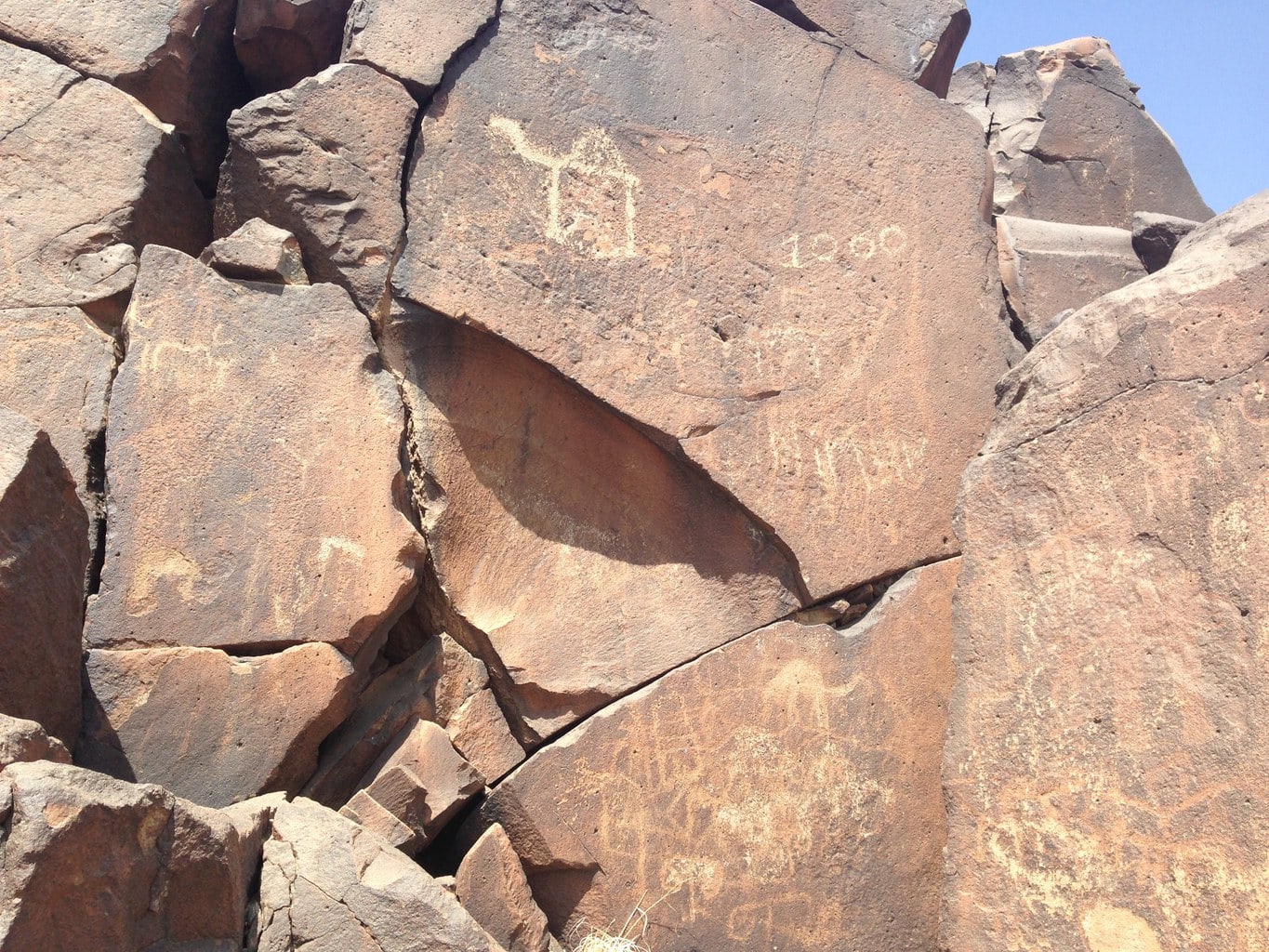
A trip to Djibouti is not complete without one of the most surreal sights you will ever see: Lake Abbe. You cannot get there by public transportation so hire a driver to take you there. The roads will disappear at one point so make sure to get one that knows his way or you will get lost in a desert of smugglers and touareg caravans. Not recommended.
The journey will take about 4-5h with a few stops to see the sights en route.
The first portion will be the most comfortable. The road is paved and has recently been fully repaved until the border with Ethiopia in Ali Sabieh. This road is the main artery and the source of Djibouti’s revenue until the new rail line is finalized. Ethiopia has no access to the sea so all their exports go through this road. You will share the pavement with large trucks carrying goods. At either side of the road the desert is overpowering. Expect large sand and dust tornados and the white expanse of nothingness. Little grows and lives in this barren part of the world except for the grubs and acacia trees. Goats can occasionally be seen, they are as resilient as the bushes.
Ask your driver to take you to see some petroglyphs that are inscribed on some rocks in the middle of the desert. You would miss them if the driver didn’t know.
At Ali Sabieh you better stop for lunch, there will not be much civilization other than the most basic hut villages after Ali Sabieh and Dikhil.
After Ali Sabieh you will carry on until Dikhil, a real-life oasis. In front of the only tourist restaurant in town there is a small forest and garden with plants and fruit trees. Water comes through from underwater rivers feeding the only vegetables you will see in the entire area. The greenery is as rare as it is beautiful.
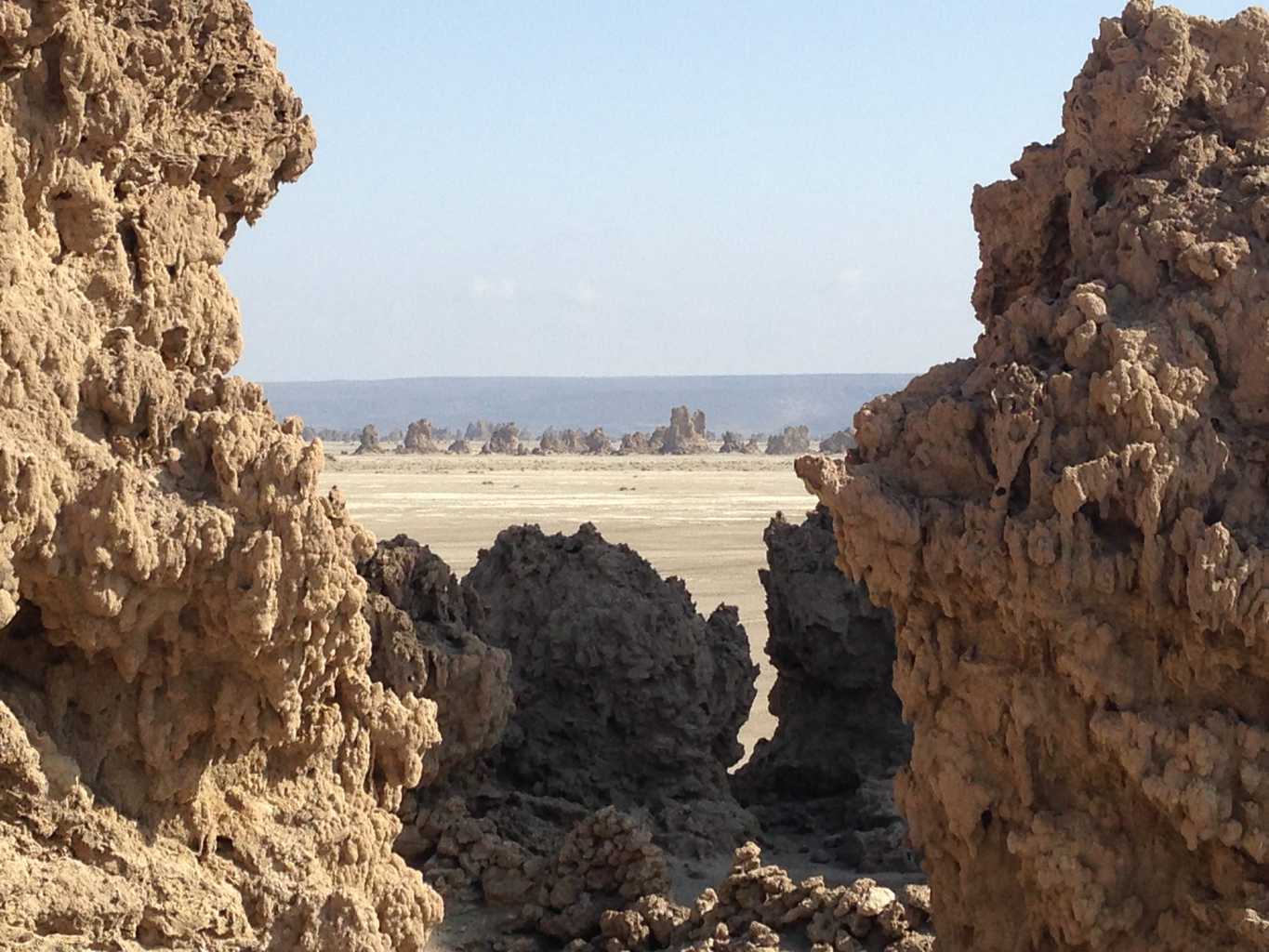
From Dikhil you will be headed into the desert and rocky south. There is nothing for kilometers on end except for the odd nomad carrying goods to and from Ethiopia on camels or even smugglers trying to bring tobacco from Ethiopia. Occasionally you will pass local villages. Extremely basic with huts made of semi-circular structures covered with mats and with rocks at the base preventing animals getting inside. We see large plastic barrels that are lined up by the road. Japanese NGOs fill them with water from time to time. Water is a scarce resource. Every time we stop to chat to a local or nomad we are asked for water. The gold of the desert.
After a few more hours on the most barren of landscapes you will finally climb a small hill on the other side of which lays Lake Abbe. The vision, from the distance, is of a surreal martian landscape. The chimneys can be clearly seen and the steam coming out is expelled into the air. The yellow bushes cover the area and herds of goats and sheep can be seen around.
You can enjoy the area as much as you like until you set up at the camp for dinner. The sunset is one of the most incredible I have ever seen, the sun will linger in the horizon for over an hour. You can read all the details of my visit to the Lake here .
Lake Abbe has a multitude of areas of interest. You can marvel at the hot springs where locals cook their meals, or the chimneys, so delicate they break to the touch. You should be careful when walking around as there are quick sands.
Day 3: Lake Abbe and Lake Assal
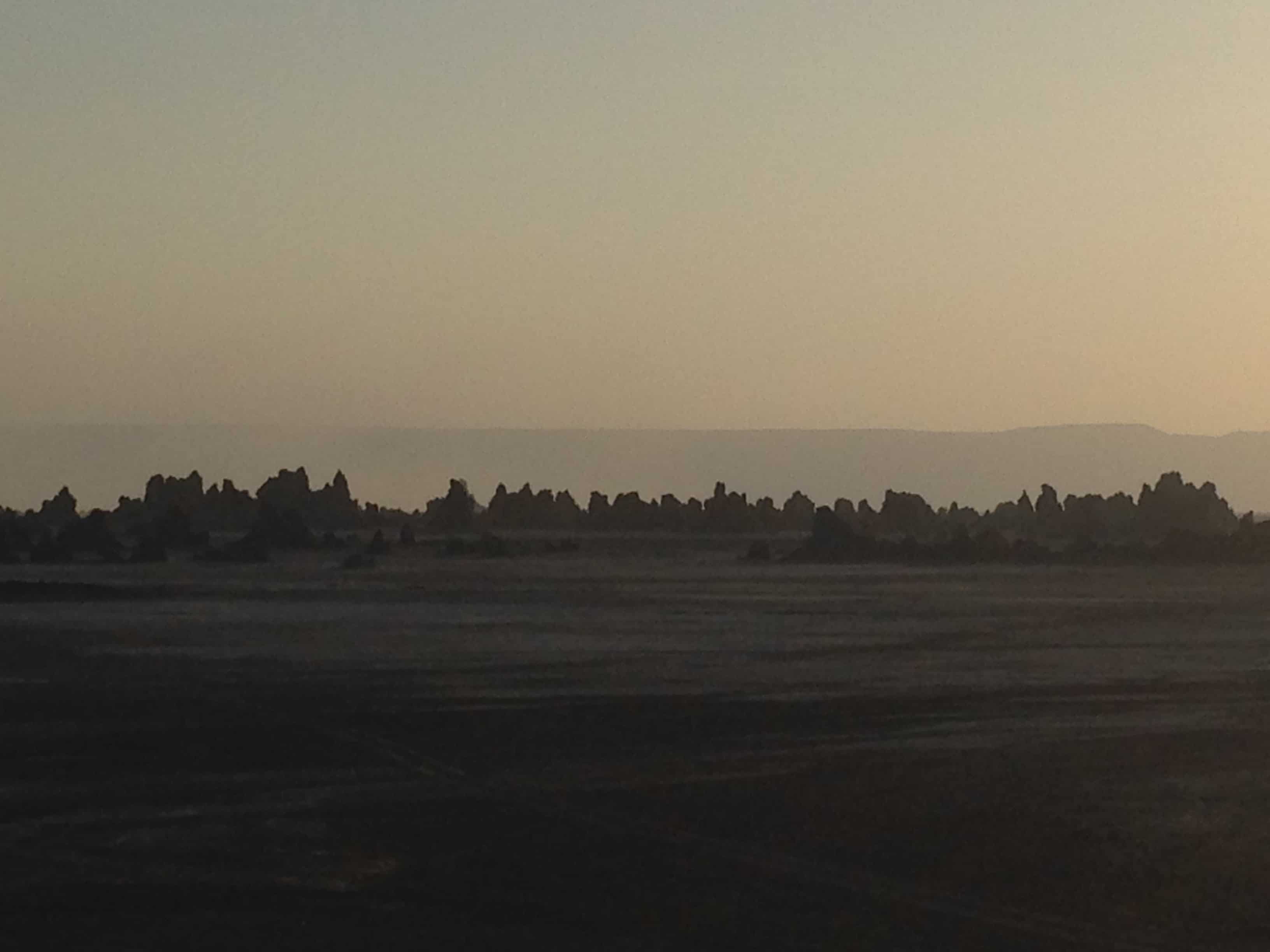
In the early morning, after a night’s sleep (I wouldn’t say a good night’s sleep) at the camp, make sure to get up and close with the pink flamingos that will come to feed at the lake shore in the distance.
Lake Abbe used to occupy the entire area that today is filled with chimneys but the building of a dam on the Ethiopian side dried out most of the Djiboutian area leaving the chimneys uncovered. Flamingos still come to feed on the same bacteria that cover the mangroves and created the chimneys. The pink color comes from what they eat.
The closer you get to them the higher the likelihood of getting stuck on the quick sands or the mud.
The area was the set of The Planet of the Apes and you can still see the main backdrop. Ask your guide to show you or Google it.
After you are done, you should drive back, retrace your steps until you reach the paved road and onto Lake Assal.
Lake Assal is the third lowest point on Earth and a salty lake. Its shores are covered with salt that is now extracted on concession by a Chinese Company.
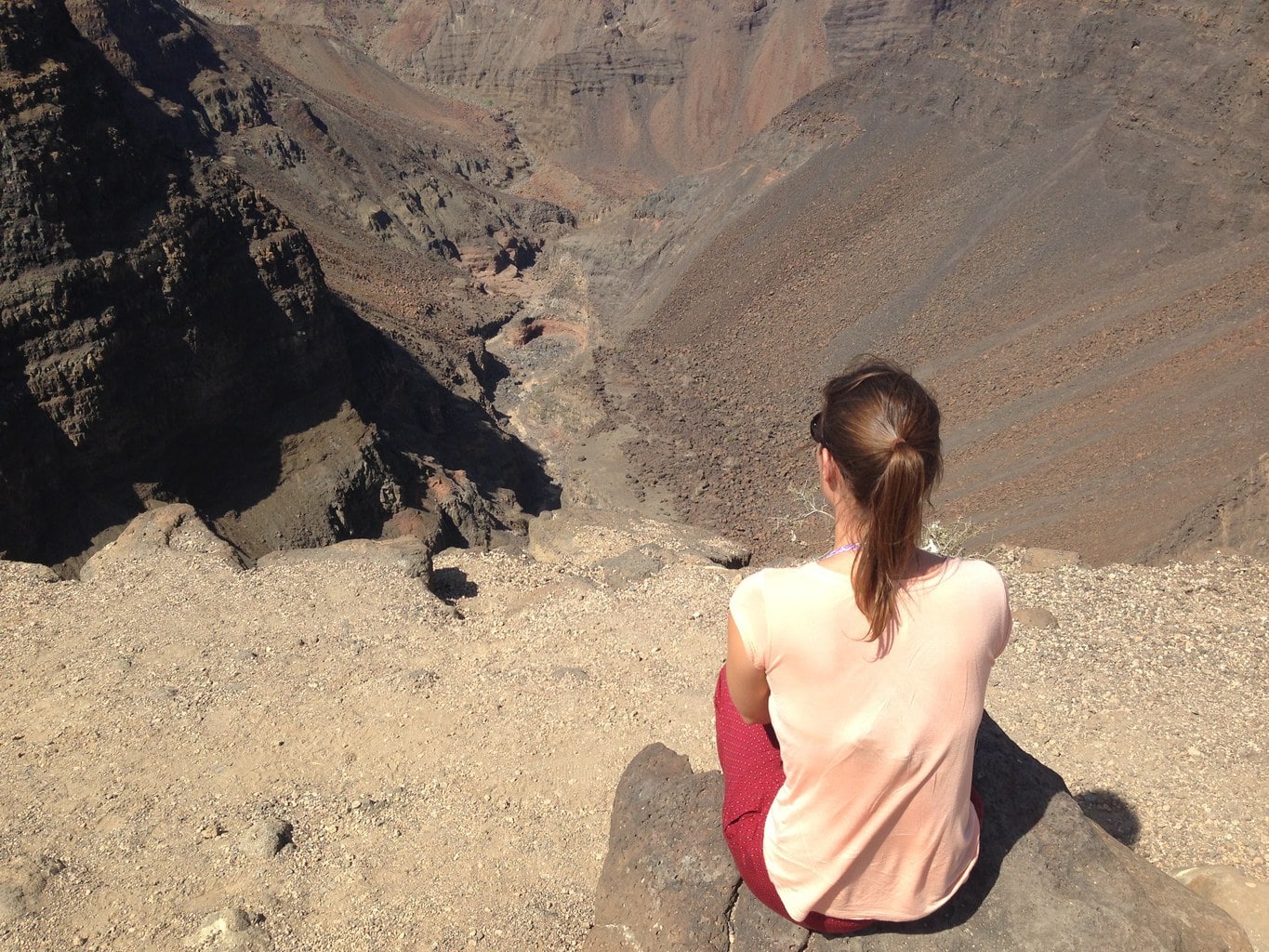
The drive will be long. Expect the exact same landscape as on the way to Lake Abbe. On the way, once you get closer to Lake Assal make sure to stop by the Grand Canyon, a grey and maroon canyon that can be observed almost from the main road. On your way you will be driving along the river and will see a few other islands.
For the brave in you, get in the water and practice your floating poses. Got a newspaper? You may as well read it while sitting back and let the salt play its part. If you do get in the water remember to wear booties as the shore is made of salt crystals that are sharp and painful to step on. And bring a towel and bottled water to rinse yourself, there are absolutely no facilities around and you don’t want to have a crust of water all over your body for the one and a half to two hour ride back to town.
Once you have seen enough of this majestic landscape it is time to drive back into Djibouti for one last evening. You may choose to relax at the hotel or you head into town for some Ethiopian food or some more Yemeni fish.
Day 4: Moucha Island
Djibouti is a tiny country with a relatively large coast and a few offshore islands. Diving is possible and you can see whale sharks during the season. But there are also a few islands, the most popular of which is Moucha Island, an easy day trip from the capital city.

Getting out and back into the port to get to Moucha Island is a complex and interesting affair. Your boat captain will have to report to the port authorities to be granted permission to leave and return and if there are any army boats anchored at port, you will be escorted by armed motorboats from the country.
At the port do not miss the opportunity to take a look at the fishermen boats that line the shore. It is said that the Somali pirates that make the international news are nothing more than the fishermen from Somalia, just like these ones, armed with sophisticated weapons.
Chances are your flight will be in the early afternoon so as soon as you are back from Moucha it will be time to pack and go.
If you had longer time I would encourage you to visit the forests in the north and the various other beaches around the city. A week would give enough time for the entire country given that it is not a very large expanse.
How to get there – Airlines flying to Djibouti
Getting to Djibouti is not easy. You can fly from Dubai, from Ethiopia or from the hair-raising Somaliland. Chances are you will arrive from the Emirate’s most famous city as it is also the best connected airport. Although there are a few other local, and possibly “doubtful” airlines to fly with, like Dallo or Jubba Airways , the best option is Dubai’s low-cost carrier, Fly Dubai , which has a penchant for flying places you need wikipedia to decipher. Think Somaliland, Iraq, Djibouti and all the second and third tier cities in Central Asia and the Middle East.
I found Fly Dubai surprisingly good. Aside from flying from a residual terminal in Dubai that is nothing like the flashy Dubai International Airport I found the airline to be remarkably premium, for a low-cost airline.
Their aircrafts were new and well appointed, and they were the first low-cost airline I’ve seen who successfully provides entertainment painlessly and hassle-free. You can just use your credit card to swipe and buy one of two movie bundles.
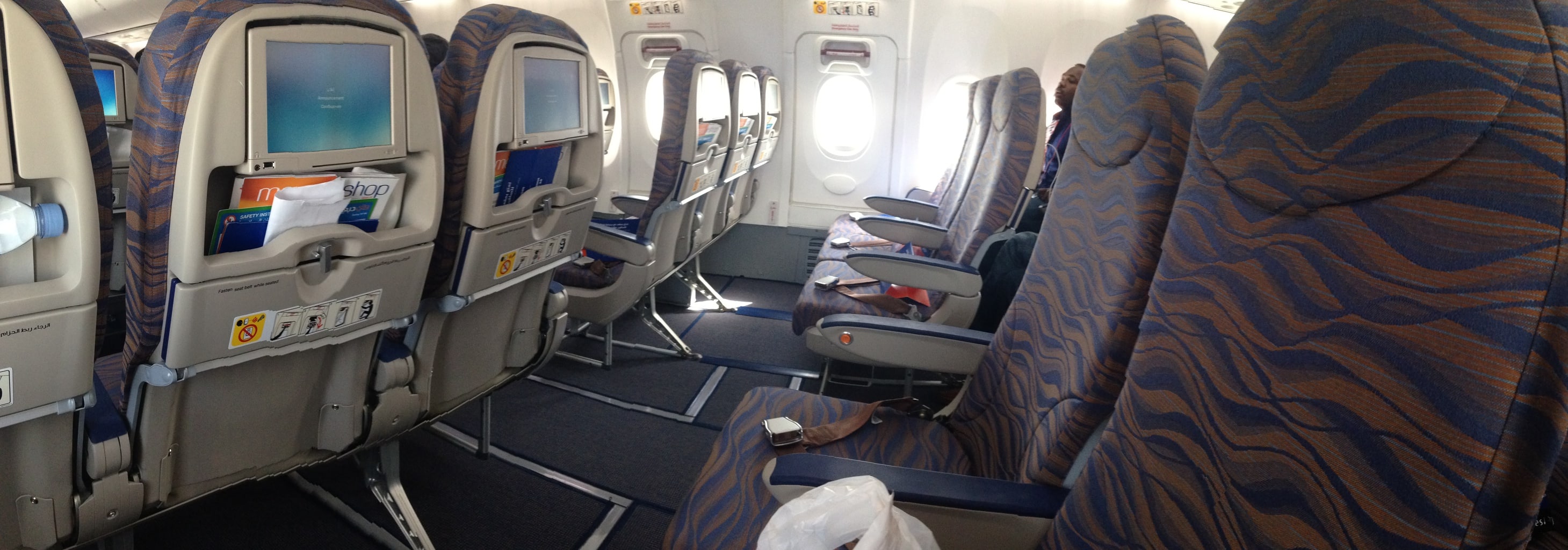
Arriving in Djibouti – Visas and Airport formalities
Landing in Djibouti is a surprise to anyone. I had limited expectations and I did not realize the importance of the country as a military base. From the sky you can already see the lines of military aircrafts, helicopters and other vehicles at the airport tarmac. The desert dusty look does not help either in erasing the feeling that you are landing in Baghdad.
Visas for Djibouti used to be available on arrival, not without putting up a fight and answering a lot of questions while waiting for unknown officials as it is at the discretion of the officials and they make you show all sorts of paperwork including return flights, residency permits wherever you live, your boarding passes, your hotel booking. Typical of many African nations sadly. If you are denied, you are turned back, and that is pretty common as reported by many travelers I know. However, since 2018, there are rumours that visa on arrival will be stopped anytime so it pays to organise one ahead of time. These need to be obtained from a Djiboutian Embassy and not the French Embassy as reported elsewhere. A lot of people get visas from the french Embassies only to be turned away or required to purchase another visa on arrival as they are not considered valid in Djibouti, so don’t rely on those, I know of people who were turned away with one of those.
After the interesting landing and immigration arguments to get a visa on arrival, you are out in the country’s heat. Since tourists or visitors of any kind are uncommon getting a taxi will not be an issue. Cars are very old, have no AC and look like they are about to die. Yet they will probably run for an additional decade.
Other things to known to plan your trip to Djibouti
Do not bring your drone to Djibouti or you may end up like me, with the drone confiscated and crying and begging the officials to keep it for you. Don’t risk it, Djibouti is a military base and they do not like anything that can pose a threat.
This would make a great addition to your #Africa Pinterest board
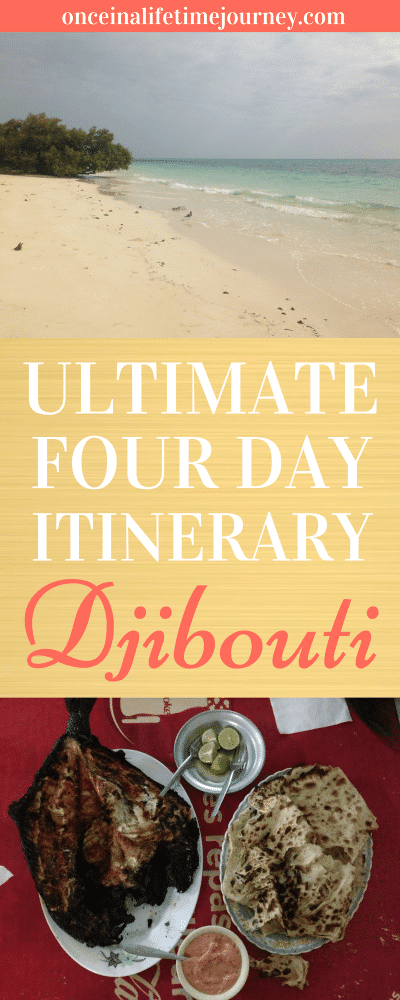
- Check if you need a visa, get help processing it at iVisa .
- Never ever leave without travel insurance. Get affordable coverage from World Nomads or long term insurance from Safety Wing .
- I find all of my flights on KAYAK . Check their Deals section too.
- Search for all your transportation between destinations on the trusted travel booking platform Bookaway .
- I book all my day trips and tours via GetYourGuide , they are the best and their tours are refundable up to 24h in advance.
- Get USD35 off your first booking with Airbnb .
- Compare hotels EVERYWHERE at HotelsCombined and book with Booking.com .
- Compare car rental prices at Rentalcars.com
You may also like
Why you should visit djibouti – the country..., who are the big five animals of africa, what to pack for a safari – expert..., what to do if you only have 1..., travel guide and things to do in somaliland, tourism in zanzibar, from the slave trade to..., top three african luxury resorts not accessible by..., things to do in cape town as recommended..., the world’s least visited countries – unknown and..., the best hotels in kigali and rwanda.
- 12 Reasons Why You Should...
12 Reasons Why You Should Visit Djibouti at Least Once in Your Lifetime

Content Writer & Media Producer
Nestled in the Horn of Africa , Djibouti is a little piece of heaven for nature and history lovers, food enthusiasts, and anyone intrigued by the ethnic composition of this tiny land inhabited since the Neolithic Age. Here’s why this fascinating country is a must-see.
The most peaceful communities in the world live together here.
Djibouti is home to three ethnic groups that live side by side in harmony and peace: Somali , Afar and Arabs have been coexisting together here since the Ifat Sultanate that dates back to the 12th century. Djiboutian people are fond of foreigners and take hospitality to a whole new level. You will never feel lonely as long as you hang out with Djiboutians, as you’ll most likely get the chance to attend a family celebration or simply be invited to share a homemade meal.

There are mountains on one side, and the Red Sea on the other
Not only does it provide one of the richest combinations of seafood and fish in the region, the Red Sea is also the perfect spot for water activities. You can go snorkeling, diving with whales and sharks , or swimming with dolphins at Mocha Island, the pearl of the Red Sea. If you’re not a water baby, the mountains are just a 2-hour drive away from Djibouti City. Being a tiny country, you can literally visit it in its entirety in just two to four days.

Djibouti City has some pretty unique architecture
Being a former French colony, Djibouti City has preserved some stunning buildings that reflect the French architectural style. You’ll be amazed at how the landscape quickly changes as you move from downtown near the nation’s assembly to Heron, or from Harmouss to Quartier 7, for instance. It’s a fascinating insight into the multi-faceted layers of Djibouti.

Djiboutians know how to party
Exclusively confined in Djibouti City, the party scene is trulyvibrant. Djiboutians definitely know how to do it! Because of its geostrategic location, Djibouti is home to thousands of foreigners, Ethiopians and lately merchants from Yemen . Djibouti is a multicultural hub by excellence, where a fusion of African, Arab, American and European music is played all week long. Don’t miss Menelik downtown or Safari Club in Kempinski Palace!
Fish fans will be in heaven
Although Djibouti is a coastal country, Djiboutians themselves are more into meat than fish. However, you’ll have access here to freshly caught fish and seafood if you make a tour of the harbor or the local market on Fridays, where mesmerizing types of fish are showcased at extremely affordable prices. If you don’t feel like cooking it yourself, just make a stop at one of the many Yemeni restaurants in the city like Al Jannatayn and enjoy the riches of the Red Sea done the authentic Yemeni way.

Djiboutian celebrations have to be seen to be believed
If you’re visiting Djibouti and you manage to make some friends, chances are that at some point you’ll be invited to an extraordinary wedding ceremony. They can literally be compared to the Holi Festival of Colors because they are so fun and colorful! A lot of ethnic groups come together, and when the bride and the groom are members of different tribes (say, a Somali marrying a Yemeni girl), you can imagine how they manage to bring all these differences together and make an amazing beautiful thing out of it.

The wildlife is stunning
The moment you see a baby deer running to hide and then, out of curiosity, freezing in front of you, it will be one of the most special things that will ever happened to you – and it can happen in Djibouti. The country is home to some amazing wildlife that is well preserved in its entirely natural habitat. Don’t be afraid if you find a herd of camels crossing the main road or resting on the sidewalk, it’s totally normal!

It’s home to the only American military base in Africa
Knowing that the only American military base in all of Africa does exists here, a tiny piece of land, is unique in itself. But once you understand the importance of the geographical position of Djibouti as one of the most important gates to the Middle East and Asia , then all the pieces fit into the puzzle. Other bases do exist as well: French, Japanese, German and lately, Chinese.
It has one of the best-kept secrets in Africa
Ghoubet Al-Kharab, or ‘devil’ island’ is an intriguing spot in the Tadjourah Gulf. Thought to be the most dangerous place in all of Djibouti ,and one of the most curious natural formations in all of Africa, legend has it that the waters are so deep here that anyone who tries to swim drowns, particularly at sunset or nighttime. Perhaps it’s better to be happy with a picture from afar…


You’ll learn new dances (and some French)
You’ll no doubt be jealous of the men and women in Djibouti who can dance to any kind of music. Put yourself to the challenge and start learning some of the coolest dances ever, from Somali, through to Ethiopian and Afar. Being a multicultural scene, you’ll quickly immerse yourself in this bustling country with life, learn some French and enjoy the Eastern African vibes.
You’ll witness the best sunsets in a long time
No caption needed. The photos speak for themselves!

And finally – you’ll see the most genuine contagious smiles!

Culture Trips launched in 2011 with a simple yet passionate mission: to inspire people to go beyond their boundaries and experience what makes a place, its people and its culture special and meaningful. We are proud that, for more than a decade, millions like you have trusted our award-winning recommendations by people who deeply understand what makes places and communities so special.
Our immersive trips , led by Local Insiders, are once-in-a-lifetime experiences and an invitation to travel the world with like-minded explorers. Our Travel Experts are on hand to help you make perfect memories. All our Trips are suitable for both solo travelers, couples and friends who want to explore the world together.?>
All our travel guides are curated by the Culture Trip team working in tandem with local experts. From unique experiences to essential tips on how to make the most of your future travels, we’ve got you covered.

Guides & Tips
The ultimate guide to whale shark diving in djibouti.

The Story Behind France’s Last Colony

How to Navigate Transport in Djibouti

See & Do
Forget the dead sea, djibouti's lake assal is the place to float.

Restaurants
The 10 best restaurants in djibouti city.

How Djibouti Got Its Unique Name

This Designer is Reinventing Men’s Clothing for Women in Djibouti

7 Customs From Djibouti Only Locals Can Understand

What and Where is the Island of the Devil?

5 Things to Help You Understand What's Happening at the Djibouti-Eritrea Border

The World Leader of Tourism is Here and He's From This Tiny Country

Food & Drink
10 traditional djiboutian dishes you need to try, culture trip spring sale, save up to $1,656 on our unique small-group trips limited spots..

- Post ID: 1859678
- Sponsored? No
- View Payload
THE 15 BEST Things to Do in Djibouti

Things to Do in Djibouti
Explore popular experiences, top attractions in djibouti.

What travellers are saying


- South Sudan
- Visa Information
- Terms & Conditions
- About Visit Horn Africa
Djibouti Travel Guide
This djibouti travel guide was created to provide you with the best and most up-to-date information on the top travel destinations in djibouti , such as djibouti city, lac abbe and lac assal, as well as travel and tour pacakges in djibouti . on this website, you will also find travel tips., along with somalia , eritrea , and ethiopia , djibouti is the fourth country that makes up the horn of africa . it has a vibrant culture that draws influences from africa, the middle east, and the indian ocean. a handful of highlights make up the diversity of this tiny country – but what highlights they are djibouti travel guide reveals its otherworldly landscapes, buzzing capital, and stylish beaches., historically, djibouti in africa combines influences from the african, arab, and indian oceans. most of the inhabitants are muslim, with somali the predominant language, and outside the capital, rural areas are home to a small number of afar tribespeople leading nomadic and traditional lives. travel in djibouti city is a wild ride, taking you through bustling city streets to apocalyptic landscapes, baking under a cloudless african sky., visa to djibouti – visa to djibouti – the djibouti immigration department has recently introduced a system that lets citizens of all countries obtain electronic rather than traditional visas., djibouti evisa or visa to djibouti allow tourists, business travellers, and embassy personnel to enter the country for tourism or business purposes and to stay in the country for up to 90 days., it is a very simple and 100% online system. once your application is accepted, you will receive your e-visa approval letter, which must be printed and presented to immigration officers upon arrival. it’s that simple., when to visit djibouti – is in the winter months (december – february) when temperatures are at their coolest and sunshine is plentiful. if you want to swim with djibouti’s famous whale sharks, travel between october and february. , get to djibout & go, getting djibouti there by air : ambouli airport is located approximately 5 km south of town. there is an extensive range of international flights available from and to djibouti city, and the service represents most international and regional airlines., ferry: there is a ferry that operates on its route between djibouti and tadjoura twice a week, and a ferry that operates on its route between djibouti and obock three times a week (dfr 1500 one way, approximately two hours for either journey). during the period spanning from mid-june until mid-september, it is not operational. l’escale is the departure point during this period., car: for 4wd rental (from dfr25,000 per day, with driver), we are ready to make arrangements for you whenever you need it., transportation: there are a number of departure points south of the city from which minibuses depart. as a result, these roads connect djibouti city to tadjoura, galafi (at the ethiopian border) and obock. most minibuses leave early in the morning and only when there are enough people for a trip. on average, a trip costs between 600 francs and 2000 francs, depending on the distance., djibouti tourist attractions, djibouti city – is now a thriving multi-ethnic city with influences from africa, asia, the arab world and europe. it was founded in 1888 by the french on a stretch of coastline that had previously been uninhabited. experiencing this diversity on foot is the best way to appreciate the city’s people, markets and cosmopolitan atmosphere., grand bara – a vast plain of dried, cracked white clay, grand bara used to be an ancient lake, and it was an emergency landing location for the space shuttle. it is planned to cross grand bara on the way to lac abbé via a road built to cross the area in 1981. this will ensure that the capital can be linked with the southern part of the country. every december, the army, police, and civilians come here to participate in a 15km race, which is organized by the french military and starts at sunrise., lac abbé – is only accessible by 4×4 and straddles the ethiopian border. you’ll drive through an apocalyptic landscape of hot springs, rock chimneys up to 50m high, and steam and sulphur belching from rock faces. (though the flamingos soften the picture). you should consider staying overnight in one of the simple afar camps to see the amazing scenery at sunrise and sunset., lac assal – this dramatic crater lake is surrounded by dark, dormant volcanoes, that are 155m below sea level – the lowest point in africa – and the second saltiest body of water in the world. a huge salt field, 60m deep, borders the aquamarine water, which stands out starkly against the black lava fields beyond. the salt is generally collected by locals or afar herders ., sables blancs beach – this pristine beach with white sand and black basalt rocks is located 7km east of tadjoura, a great place to unwind after exploring the interior of djibouti. there are excellent facilities here, and it’s a popular destination for weekend getaways among expats. from october to january, djibouti whale sharks visit the gulf of tadjoura and can be observed snorkelling or kayaking., tadjoura – this is the oldest town in djibouti, an important port connected by a ferry to djibouti city. it’s a picture-perfect place, located below the green goda mountains , with palm trees, whitewashed buildings, and mosques that are infused with a strongly arabian vibe. it’s a nice place to explore before moving on to a beautiful beach., privacy overview, pin it on pinterest.
- visithornofafrica
- visithornafrica
- TRAVEL JOURNAL
- Write for Traveler’s Buddy
- Media content
- Video Content
- Photography and Video content
A travel guide for Djibouti City – East Africa’s melting pot
Undervalued, charming and enchanting, Djibouti City is a journey through Arab, East African and European influences.
My drive from Djibouti’s international airport to the capital’s city center was calm and straightforward. No masses of people walking on the road, hundreds of cars beeping for no reason, or standstill traffic jams. Way differently – it was so calm, I rolled my window down, noticed the diverse architecture along the streets, and enjoyed the warm wind blowing on my face under the sofocating heat. This was not the chaotic, multicultural East African city I was expecting, but the beginning of rediscovering East Africa and exploring one of Africa’s most interesting capitals: Djibouti City, also known as the Paris of Africa .
A melting pot in the Horn of Africa
My first stop in Djibouti City was the European Quarter, a weird mix of French colonial houses and Moorish architecture. Wandering around this area felt like getting lost in an abandoned French village. Gorgeous, yet broken down classic structures painted in light colours surrounded the main square, while a couple of pâtisseries displayed signs offering fresh orange juice and croissants for breakfast.
And while the highlight of the European Quarter is the central square, Place du 27 Juin 1977, walking around the whole district means getting lost in history and experience the Arab and European influences Djibouti City had over the past decades. This is also the perfect place to get some food during the day, as well enjoy a cold beer at night.
INSIDE INFO: While luxury hotels like Kempinski or Sheraton are located in the district of Heron, I found the European Quarter as the best area to find inexpensive and nice accommodation. Furthermore, take into consideration that many hotels will ask for a certificate of marriage if you are planning to stay with someone from the opposite sex in the same room.
South of the European Quarter is located the African Quarter. This is consider the center of the action and the soul of Djibouti City. Street vendors offering fruits, clothes, or any other possible unnecessary accessory dragged me to see their products, while the crisscross of alleys made me feel I was lost in an urban labyrinth.
This is also the area where the Central Market is located. It is one of the largest markets in the city (Still, very small compared to the ones you see in Somaliland or Ethiopia), and a great place to find local souvenirs, as well great food from the region.
A city with many activities to offer
Most people come to Djibouti City just to do business or to stay overnight before heading to the highlands of the country. During my stay in this capital, I didn’t see another tourist exploring its markets or tasting the local restaurants. However, I think Djibouti City offers a unique mix of cultures that prevailed through decades and makes this city very dynamic and vibrant.
The Hamoudi Mosque, the Turkish Mosque and the presidential palace are outstanding places for a quick visit, while the corniche next to Rue de Venice and Rue de Geneve offer excellent spots to taste the local fish, grab a cold drink and enjoy the view of the harbour.
Djibouti City’s famous beaches, Heron Beach and La Siesta Plage, are unfortunately quite dirty and not the beach experience you want to have. Therefore, if you really want to get into the water without leaving Djibouti City, a hotel with a pool would be the best choice.
Unlike what you expect from a calm and quiet city, nights in Djibouti City are exciting. The bars of corniche area open their doors for locals and visitors and with a wonderful atmosphere and great weather at night, there is probably not a better place in the city to grab a drink, eat some dinner, listen music and smoke some shisha. Other bars in the European Quarter are good for a cold beer and a bite. However, the coastal vibe you would expect from a city next to the sea is not as palpable as in the corniche.
Read more: Best things to do in Hargeisa
NOTE: One of the most popular spots for tourists is the Kempinski Hotel. Here, military members living in Djibouti, business men, as well tourists purchase day passes for the swimming pool area or stay overnight for drinks at the bar. While this is probably the only place in Djibouti City with proper western standards in service and quality, there is not much difference in being there or at any other beach hotel in the world. The beauty of Djibouti City was for me hidden in its alleys and not in their fancy hotels.
Read more: Exploring the White and Black desert in Egypt
Getaways and day trips from Djibouti City
To be honest, Djibouti City is not the place to stay longer than a week. The country has way too much to offer and while the city offers a fresh experience for any traveler exploring East Africa, the real beauty of this tiny country is located far away from the urban areas.
These are some of the best places to explore from Djibouti City on a day trip:
Due to its isolated location, Lac Abbe is rather a place for a 2-day trip from Djibouti City. However, going to Lac Abbe is worth it no matter how long you stay. This is in my opinion one of the places you HAVE to visit if you come to Djibouti, and while tours can be quite pricey, this wonder of nature will leave you speechless.
Its dotted limestone chimneys standing as high as 50 meters transport you to some kind of lunar landscape that makes you forget for a moment that you are on planet earth.
Don’t be confused by its Caribbean lookalike views, Lac Assal is one of the most inhospitable places on earth and one of the most incredible places you can visit as a traveler. Lac Assal is located 150 meters below sea level. It is the third lowest point on earth and the saltiest one outside Antartica.
Day tours to Lac Assal can be easily arrange in Djibouti City and they are not as expensive as going to Lac Abbe. Many travelers even combine Lac Abbe and Lac Assal in a 3-day/2-nights tour.
Moucha Island
For those looking for a proper beach experience, Moucha Island is probably the place to go. This tiny island located 20 minutes from Djibouti City is a very popular getaway for foreigners living in Djibouti.
Here you won’t only find the most beautiful beach of Djibouti, but also a nice spot to do snorkeling, diving or sea kayaking.
Read more: How to cross the border between Djibouti and Somaliland
NOTE: The best way to arrange tours spontaneously, compare local prices and even negotiate the final price is by visiting the National Tourism Office at the European Square. They provide a full travel guide for Djibouti City and its surroundings, information about which tours are available, which regions are accessible and even get you directly in contact with the tour operator.
Djibouti City in a nutshell
Where to eat: The popular Chez Hamdani restaurant located in the African Quarter is always a good choice. This is the place to go for the famous Yemeni fish. However, don’t expect a fancy place, as there are no menus. You simply choose your fish of preference from an open freezer and get your hands dirty enjoying the meal.
Where to drink: Sixteen Eleven Kitch’n is where the fun is at night. This beach bar is located next to the harbour and offers a fresh atmosphere full tasty drinks, great music and shisha. It is a very popular spot for young Djiboutians and a fantastic place to experience how locals enjoy a Friday night.
Where to sleep: With prices over 200 EUR a night, the Kempinski and Sheraton hotels are way too overpriced and while hotels in Djibouti City rarely go under 80 EUR a night, hotels in traditional buildings like Auberge le Heron offer a classic vibe in the middle of this vibrant city.
Where to buy something traditional: Several shops at the European Quarter offer traditional East African souvenirs. However, a popular present to take home could a stone from Lac Assal. These can be sold directly at Lac Assal or at some shops in the city center.
Read more: Exploring East Africa – Visiting the Danakil Depression in Ethiopia
Djibouti is a mix of cultures. It has some sections that made me feel in Europe, others that made me feel in Morocco or Tunisia. At the same time, it is a place in its own and a good 3-4 day stop if you are exploring East Africa. The expensive prices of the country scare travelers. However, this is a place like no other and missing it, would be missing a unique side in Africa.
Read more: A travel guide for Lac Abbe and Lac Assal in Djibouti
How do I find cheap flights to Djibouti?
Finding a cheap flight anywhere around the world is not always easy. It’s about comparing platforms, selecting the right routes and booking at the right time. Fortunately, platforms like Skyscanner became known as an all-in-one tool for booking flights at the lowest cost possible.
They analyse every potential company and sub-contractor in order to find the lowest price available for you. Not only that, but you can also select the option “Travel Anywhere” and let Skyscanner find the cheapest place to travel at any selected date.
I check all my flights first at Skyscanner , and in 90% of the cases, I find the best option for me to book.
Also, by booking here using Skyscanner , you will support my blog and help me create more amazing and useful content.
MY FAVORITE NATIONAL PARKS
Saxon switzerland national park, masai mara natural reserve, bwindi impenetrable forest, white desert protected area, victoria falls national park.
Security Alert May 17, 2024
Worldwide caution, update may 10, 2024, information for u.s. citizens in the middle east.
- Travel Advisories |
- Contact Us |
- MyTravelGov |
Find U.S. Embassies & Consulates
Travel.state.gov, congressional liaison, special issuance agency, u.s. passports, international travel, intercountry adoption, international parental child abduction, records and authentications, popular links, travel advisories, mytravelgov, stay connected, legal resources, legal information, info for u.s. law enforcement, replace or certify documents.
Before You Go
Learn About Your Destination
While Abroad
Emergencies
Share this page:
Travel Advisory July 31, 2023
Djibouti - level 2: exercise increased caution.
Reissued with obsolete COVID-19 page links removed.
Exercise increased caution in Djibouti due to terrorism and crime .
Terrorists may attack with little or no warning, targeting tourist locations, transportation hubs, markets, shopping malls, government facilities, hotels, clubs, restaurants, places of worship, parks, major sporting and cultural events, educational institutions, airports, hospitals, and other public areas.
Read the country information page .
If you decide to travel to Djibouti:
- Be aware of your surroundings when traveling to tourist locations and crowded public venues.
- Follow the instructions of local authorities.
- Monitor local media for breaking events and adjust your plans based on new information.
- Enroll in the Smart Traveler Enrollment Program ( STEP ) to receive Alerts and make it easier to locate you in an emergency.
- Follow the Department of State on Facebook and Twitter .
- Review the Country Security Report for Djibouti.
- Prepare a contingency plan for emergency situations. Review the Traveler’s Checklist .
- Visit the CDC page for the latest Travel Health Information related to your travel.
Embassy Messages
View Alerts and Messages Archive
Quick Facts
Must have at least 6 months validity
Yellow fever, if arriving from a yellow-fever prone country
Embassies and Consulates
U.S. Embassy Djibouti Lotissement Haramous, Lot # 350-B P.O. Box 185 Djibouti City, Republic of Djibouti Telephone: +(253) 21-45-30-00 (Sunday to Thursday, 8:00 a.m.-4:30 p.m.) Fax: +(253) 21-45-33-40 Email: [email protected]
Destination Description
Learn about the U.S. relationship to countries around the world.
Entry, Exit and Visa Requirements
Requirements for Entry:
- Passport (with at least six months validity)
- Visa applications can be submitted directly to the Embassy of the Republic of Djibouti in Washington, D.C.
- Visitors can apply for visas upon arrival. The fee is $23.
- Overseas inquiries should be made at the nearest Djiboutian embassy or consulate. Contact the French embassy in countries where there is no Djiboutian consular presence.
- The Djiboutian eVisa site is still up and accepting applications, but we have received reports that applications do not go through successfully.
- World Health Organization (WHO) card with yellow fever vaccination, if you have arrived from a yellow-fever prone country.
If you are traveling to Djibouti in support of U.S. Department of Defense (DoD) activities, follow directions per the Foreign Clearance Guide.
Journalists are required to have a letter of accreditation approved in advance by the Ministry of Communication and Culture . U.S. journalists and other journalists working for U.S.-based media institutions should contact the U.S. Embassy’s Public Affairs Section at [email protected] at least two weeks prior to travel to facilitate this accreditation process. Journalists who fail to receive an accreditation letter risk arrest, seizure of equipment, and/or expulsion.
The U.S. Department of State is unaware of any HIV/AIDS entry restrictions for visitors to, or foreign residents of, Djibouti.
Find information on dual nationality , prevention of international child abduction , and customs information on our websites.
Safety and Security
Terrorism: Terrorist groups and those inspired by such organizations are intent on attacking U.S. citizens abroad. Terrorists are increasingly using less sophisticated methods of attack – including knives, firearms, and vehicles – to target crowds more effectively. Frequently, their aim is unprotected or vulnerable targets, such as:
- High-profile public events (sporting contests, political rallies, demonstrations, holiday events, celebratory gatherings, etc.)
- Hotels, clubs, and restaurants frequented by tourists
- Places of worship
- Schools
- Parks
- Shopping malls and markets
- Public transportation systems (including subways, buses, trains, and scheduled commercial flights)
Although there have been no terrorist incidents reported in Djibouti since 2014, regional terrorist groups continue to threaten Western targets and interests and can easily cross borders to conduct attacks in public places where Westerners congregate.
For more information, see our Terrorism page.
Civil unrest or armed conflict in the neighboring countries of Ethiopia, Eritrea, Yemen, and Somalia may affect the security situation in Djibouti.
Tensions along the Djibouti-Eritrea border exist from an ongoing border dispute, necessitating approval from the Djibouti government before travel north of Obock. Border skirmishes have occurred in the past.
Many border areas between Djibouti and both Ethiopia and Somalia lack visible demarcation and may still contain landmines.
Crime: Crimes of opportunity are most common and include pickpocketing, purse snatching, theft from or of vehicles, and identity theft (by stealing credit card information).
- Avoid walking alone, especially after dark, and displaying cash and valuable personal property.
- Avoid actions that would draw attention to yourself.
- Dress conservatively.
- Drive with doors locked and windows closed.
- Travel with a copy of your U.S. passport and Djibouti visa to prevent the originals from being taken. Keep original documents in a secure location.
- Keep your credit card in your sight at all times while it is being processed. Consider using prepaid credit cards with limited funds when traveling.
Demonstrations: Demonstrations occur occasionally and sometimes without warning. They may take place in response to political or economic issues, on politically significant holidays, and during international events.
- Even demonstrations intended to be peaceful can turn confrontational and possibly become violent.
- Avoid areas around protests and demonstrations.
- Check local media for updates and traffic advisories.
International Financial Scams: See the Department of State and the FBI pages for information.
Victims of Crime: U.S. citizen victims of serious crimes, including victims of sexual assault, are encouraged to contact the U.S. Embassy for assistance. Report crimes to the local police by dialing 17 throughout Djibouti (French/Arabic) and contact the U.S. Embassy at +253 21-453-000 during business house and +(253) 77-877-229 after hours. Remember that local authorities are responsible for investigating and prosecuting crime.
See our webpage on help for U.S. victims of crime overseas .
We can:
- Help you find appropriate medical care
- Assist you in reporting a crime to the police
- Contact relatives or friends with your written consent
- Provide general information regarding the victim’s role during the local investigation and following its conclusion
- Provide a list of local attorneys
- Provide our information on victim’s compensation programs in the United States.
- Provide an emergency loan for repatriation to the United States and/or limited medical support in cases of destitution
- Help you find accommodation and arrange flights home
- Replace a stolen or lost passport
Domestic Violence: U.S. citizen victims of domestic violence are encouraged to contact the Embassy for assistance.
Tourism: The tourism industry is unevenly regulated, and safety inspections for equipment and facilities do not commonly occur. Hazardous areas or activities are not always identified with appropriate signage, and staff may not be trained or certified either by the host government or by recognized authorities in the field. In the event of an injury, appropriate medical treatment is typically available in the capital, Djibouti City. First responders are generally unable to access areas outside of major cities and to provide urgent medical treatment. U.S. citizens are encouraged to purchase medical evacuation insurance. See our webpage for more information on insurance providers for overseas coverage .
Local Laws & Special Circumstances
Criminal Penalties: You are subject to local laws. If you violate local laws, even unknowingly, you may be expelled, arrested, or imprisoned. Individuals establishing a business or practicing a profession that requires additional permits or licensing should seek information from the competent local authorities, prior to practicing or operating a business. Convictions for possessing, using, or trafficking in illegal drugs result in long prison sentences and heavy fines. Although the narcotic khat is legal in Djibouti, it is illegal in many countries, including the United States. Furthermore, some laws are also prosecutable in the United States, regardless of local law. For examples, see our website on crimes against minors abroad and the Department of Justice website.
Photography: It is illegal to take pictures of government buildings, military installations or personnel, and other infrastructure such as air and seaports, bridges, and public buildings, as well as of religious sites, such as mosques. You could be fined, have your photographic equipment confiscated, and risk detention and/or expulsion. Do not take photos of Djiboutians without their permission.
Children: Dual Somali-U.S. or Djiboutian-U.S. citizens should be aware that moving children to Djibouti or Somalia (including Somaliland) from the United States for the purpose of having Female Genital Mutilation/Cutting (FGM/C) performed can be prosecuted in both countries. FGM/C is illegal under both Djiboutian and U.S. law.
Arrest Notification: If you are arrested or detained, ask police or prison officials to notify the U.S. Embassy immediately. See our webpage for further information. Djiboutian law enforcement officials occasionally prevent foreigners from contacting anyone while in detention. Because of this, the U.S. Embassy may not receive notification of an arrest or may not be allowed access to you if you are detained.
Phone Service: Although land lines do exist in parts of Djibouti, cellular phones are the norm. You may purchase a SIM card locally for use in an unlocked GSM cell phone. You will need to present your passport to complete the purchase. The national cellular phone provider is Djibouti Telecom. Telecommunications systems outside of Djibouti City are unreliable or non-existent.
Currency: The Djiboutian Franc (DJF) is the official currency. It is a cash economy; credit cards are accepted at major hotels and supermarkets only. Most vendors and banks will only take bills printed after 2006 due to counterfeiting. Exchange currency only at reputable banks. ATMs are limited and may not recognize U.S.-issued credit cards, including MasterCard, though Visa generally works.
Firearms: Strict regulations may be enforced on the temporary import and export of firearms. Contact the Embassy of Djibouti in Washington, D.C., or the Djibouti National Police for specific information regarding customs and registration requirements prior to travel. Hunting without a permit is illegal.
Counterfeit and Pirated Goods: Although counterfeit and pirated goods are prevalent in many countries, they may still be illegal according to local laws. You may also pay fines or have to relinquish them if you bring them back to the United States. See the U.S. Department of Justice website for more information.
Faith-Based Travelers: See the following webpages for details:
- Faith-Based Travel Information
- International Religious Freedom Report – see country reports
- Human Rights Report – see country reports
- Hajj Fact Sheet for Travelers
- Best Practices for Volunteering Abroad
LGBTI+ Travelers: While there are no legal restrictions on same-sex sexual relations or the organization of LGBTI events, societal norms do not allow for the public discussion of homosexuality and there are no known LGBTI organizations. Authorities may prosecute public display of same-sex sexual conduct under laws prohibiting attacks on “good morals.” No antidiscrimination law exists to protect LGBTI individuals. See our LGBTI Travel Information page and section six of our Human Rights report for further details.
Travelers with Disabilities: The law in Djibouti does not prohibit discrimination against persons with physical, sensory, intellectual or mental disabilities. Social acceptance of persons with disabilities in public is not as prevalent as in the United States. Few government buildings, schools, banks, or grocery stores have accessible facilities, including in Djibouti City. Some hospitals and clinics are equally inaccessible to people with disabilities and lack wheelchair ramps or lifts, including some of the hospitals travelers commonly use. Expect accessibility to be very limited in transportation, lodging, communication/information, and general infrastructure.
Accessibility equipment is generally not available in Djibouti. Replacement parts, rental and repair facilities for aids/equipment/devices or service providers such as sign language interpreters or personal assistants are not available.
Students: See our Students Abroad page and FBI travel tips .
Women Travelers: The law prohibits female genital mutilation/cutting (FGM/C) and the government is actively working to eliminate the practice. While rates of new FGM/C cases have declined, 70.7% of women and girls nationally have been subjected to the practice. Reliable rape statistics are not available, and laws for sentencing perpetrators are not enforced effectively. Domestic violence is common but underreported. Rather than the courts, families and the informal clan-based justice system generally handle cases of domestic abuse or violence. Police rarely intervene in domestic violence incidents. The National Union of Djiboutian Women operates a walk-in counseling center (Cellule d’Ecoute) in Djibouti City that provides services and referrals for women and men. See our travel tips for Women Travelers .
Please visit the Embassy's COVID-19 page for more information on COVID-19 in Djibouti. Consult the CDC website for Djibouti prior to travel.
Medical facilities in the capital of Djibouti are limited, and facilities are nonexistent in many outlying areas. Trauma care is only intended to stabilize a patient prior to medical evacuation. Medicines are expensive and often in short supply. Most care providers expect payment in U.S. dollars or Djiboutian francs before treatment is provided.
For emergency services in Djibouti, dial 18.
Ambulance services are available from Balbala Hospital in Djibouti City. To obtain ambulance services contact Moussa, cell phone #77824912.
- Ambulance services are not widely available, and training and availability of emergency responders may be below U.S. standards.
- Injured or seriously ill travelers may prefer to take a taxi or private vehicle to the nearest major hospital rather than wait for an ambulance.
We do not pay medical bills. Be aware that U.S. Medicare/Medicaid does not apply overseas. Most hospitals and doctors overseas do not accept U.S. health insurance.
Medical Insurance: Make sure your health insurance plan provides coverage overseas. Most care providers overseas only accept cash payments. See our webpage for more information on insurance providers for overseas coverage. Visit the U.S. Centers for Disease Control and Prevention for more information on type of insurance you should consider before you travel overseas.
We strongly recommend supplemental insurance to cover medical evacuation.
Always carry your prescription medication in original packaging, along with your doctor’s prescription. Check with the Ministry of Health to ensure the medication is legal in Djibouti.
Dual U.S.-Djiboutian citizens with disabilities may qualify for education and health services through the Ministry of National Solidarity and the Ministry for the Promotion of Women and Family Planning.
The following diseases are prevalent:
- African Tick Bite Fever
- Chikungunya
- Hepatitis A
- Hepatitis B
- Leishmaniasis
- Leptospirosis
- Schistosomiasis
- Tuberculosis (TB)
Use the U.S. Centers for Disease Control and Prevention recommended mosquito repellents and sleep under insecticide-impregnated mosquito nets. Chemoprophylaxis is recommended for all travelers even for short stays.
Given Djibouti’s proximity to the Arabian Peninsula, the Middle East Respiratory Syndrome (MERS) is also a risk.
Vaccinations: Be up to date on all vaccinations recommended by the U.S. Centers for Disease Control and Prevention. Further health information:
- World Health Organization
- U.S. Centers for Disease Control and Prevention (CDC)
Air Quality: Visit AirNow Department of State for information on air quality at U.S. Embassies and Consulates.
The U.S. Embassy maintains a list of doctors and hospitals . We do not endorse or recommend any specific medical provider or clinic.
Travel and Transportation
Road Conditions and Safety: Although main roads in Djibouti City are well maintained, others are unpaved or in poor repair and subject to unexpected flooding. Highways are prone to frequent rockslides. Many roads wind through steep ravines and lack guardrails.
Police occasionally set up random roadblock stops on major roads to conduct inspections of vehicle registration and insurance.
Outside of Djibouti City, hazards include narrow roads, insufficient lighting, poor vehicle maintenance (missing headlights) and wayward pedestrians and livestock. Police set up roadblocks on major roads which are not clearly visible at night. Other risks include excessive speeding and erratic driving habits. The widespread use of the narcotic khat by drivers contributes to speeding and unsafe driving habits.
When driving outside Djibouti City, use convoys of two vehicles in case one car becomes disabled and avoid all travel after dark. Carry additional fuel and provisions (water, satellite phone, first aid kit). Gas stations are located at a considerable distance from one another and sell only diesel fuel in rural areas. There are few professional roadside assistance services.
Landmines: Stay on paved roads. Unmarked landmines exist in the border region with Eritrea, though most landmines have been marked or cleared from border regions.
Traffic Laws: A U.S. driver’s license or International Driving Permit is required to drive in Djibouti. The use of cell phones while driving is prohibited. Exercise caution at intersections; drivers often run red lights and do not stop at intersections. Third-party liability insurance is required, and you must display the insurance sticker.
Accidents: Remain inside the vehicle and wait for the traffic police or gendarmes. If a hostile mob forms or you feel you are in danger, leave the scene in your vehicle if possible and proceed directly to the nearest police station to report the incident. If you are injured, drive to the nearest hospital or clinic.
Public Transportation: Avoid all travel by public transportation and hire private transport from a reliable source. Public transportation is unregulated, unreliable, and generally unsafe. Hotel and airport shuttle services are a safe alternative. Taxis are available but are considered unsafe. U.S. Embassy personnel are prohibited from riding in buses or taxis.
The capital city and the towns of Obock and Tadjoura have intercity bus and ferry services. An electric limited rail, replacing the century-old Ethio-Djibouti railway, began operation in October 2016 with freight service and, later, passenger service.
Hiring a vehicle: Reputable car rental firms can include the services of a driver. Be particularly vigilant at airports where criminals use luggage tag information to present themselves as pre-arranged drivers. Do not use your passport as a security deposit. If you allow your passport to be photocopied, keep it in your sight at all times.
See our Road Safety page for more information.
Aviation Safety Oversight: As there is no direct commercial air service to the United States by carriers registered in Djibouti, the U.S. Federal Aviation Administration (FAA) has not assessed the government of Djibouti’s Civil Aviation Authority for compliance with International Civil Aviation Organization (ICAO) aviation safety standards. See the FAA’s safety assessment page . Due to security concerns, U.S. Embassy personnel are prohibited from taking commercial flights originating in Somalia that stop in Djibouti as part of a multi-leg flight.
Maritime Travel: Mariners planning travel to Djibouti should also check for U.S. maritime advisories and alerts . Information may also be posted to the U.S. Coast Guard homeport website , and the NGA broadcast warnings .
The threat of piracy remains significant. Pirates have held foreigners hostage for ransom. Reports of attacks on local fishing boats in Djiboutian coastal waters continue. Djiboutian military ships are clearly marked and may turn away small craft or divert vessels to verify citizenship of passengers.
Use established sea lanes, and pilot vessels in groups to reduce the risk of being hijacked.
See the Live Piracy Report published by the International Maritime Bureau.
In case of emergency, contact the Djiboutian Coast Guard or Djiboutian Navy on UHF marine channel 16, or the Yemeni Coast Guard on channel 16 or at 967 1-562-402.
Port Security: The Commandant of the Coast Guard has determined that effective anti-terrorism measures are not in place in Djibouti ports and has imposed conditions of entry on vessels that arrive in U.S. ports having visited ports in Djibouti. Mariners and passengers on commercial vessels traveling through the ports of Djibouti should exercise increased caution.
For additional travel information
- Enroll in the Smart Traveler Enrollment Program (STEP) to receive security messages and make it easier to locate you in an emergency.
- Call us in Washington, D.C. at 1-888-407-4747 (toll-free in the United States and Canada) or 1-202-501-4444 (from all other countries) from 8:00 a.m. to 8:00 p.m., Eastern Standard Time, Monday through Friday (except U.S. federal holidays).
- See the State Department’s travel website for the Worldwide Caution and Travel Advisories .
- Follow us on Twitter and Facebook .
- See traveling safely abroad for useful travel tips.
Review information about International Parental Child Abduction in Djibouti . For additional IPCA-related information, please see the International Child Abduction Prevention and Return Act ( ICAPRA ) report.
Travel Advisory Levels
Assistance for u.s. citizens, djibouti map, learn about your destination, enroll in step.

Subscribe to get up-to-date safety and security information and help us reach you in an emergency abroad.
Recommended Web Browsers: Microsoft Edge or Google Chrome.
Make two copies of all of your travel documents in case of emergency, and leave one with a trusted friend or relative.
Afghanistan
Antigua and Barbuda
Bonaire, Sint Eustatius, and Saba
Bosnia and Herzegovina
British Virgin Islands
Burkina Faso
Burma (Myanmar)
Cayman Islands
Central African Republic
Cote d Ivoire
Curaçao
Czech Republic
Democratic Republic of the Congo
Dominican Republic
El Salvador
Equatorial Guinea
Eswatini (Swaziland)
Falkland Islands
France (includes Monaco)
French Guiana
French Polynesia
French West Indies
Guadeloupe, Martinique, Saint Martin, and Saint Barthélemy (French West Indies)
Guinea-Bissau
Isle of Man
Israel, The West Bank and Gaza
Liechtenstein
Marshall Islands
Netherlands
New Caledonia
New Zealand
North Korea (Democratic People's Republic of Korea)
Papua New Guinea
Philippines
Republic of North Macedonia
Republic of the Congo
Saint Kitts and Nevis
Saint Lucia
Saint Vincent and the Grenadines
Sao Tome and Principe
Saudi Arabia
Sierra Leone
Sint Maarten
Solomon Islands
South Africa
South Korea
South Sudan
Switzerland
The Bahamas
Timor-Leste
Trinidad and Tobago
Turkmenistan
Turks and Caicos Islands
United Arab Emirates
United Kingdom
Vatican City (Holy See)
External Link
You are about to leave travel.state.gov for an external website that is not maintained by the U.S. Department of State.
Links to external websites are provided as a convenience and should not be construed as an endorsement by the U.S. Department of State of the views or products contained therein. If you wish to remain on travel.state.gov, click the "cancel" message.
You are about to visit:
Djibouti Travel Guide
Popular destinations, san francisco, new york city.
- Terms of Use
- Privacy Policy
- Your US State Privacy Rights
- Children's Online Privacy Policy
- Interest-Based Ads
- About Nielsen Measurement
- Do Not Sell or Share My Personal Information
- Nat Geo Home
- Attend a Live Event
- Book a Trip
- Inspire Your Kids
- Shop Nat Geo
- Visit the D.C. Museum
- Learn About Our Impact
- Support Our Mission
- Advertise With Us
- Customer Service
- Renew Subscription
- Manage Your Subscription
- Work at Nat Geo
- Sign Up for Our Newsletters
- Contribute to Protect the Planet
Copyright © 1996-2015 National Geographic Society Copyright © 2015-2024 National Geographic Partners, LLC. All rights reserved

What You Need To Know About Visiting The Forgotten Djibouti In The Horn Of Africa
Quick links, what to know about djibouti in the horn of africa, attractions and things to do in djibouti, what to know about visiting djibouti.
The Horn of Africa region has often had problems with stability and the region often gets in the news for all the wrong reasons. But the small country of Djibouti has long been an example of relative stability in the region. Djibouti offers the chance to visit and get a glimpse of a region that is often difficult to visit.
Djibouti occupies part of the Afar Triangle ( Ethiopia's stunning Danakil Depression with its other-worldly landscapes is part of the Afar Triangle). Those who do get to visit Ethiopia should consider visiting the Gelada Monkeys of the highlands (although take note of travel advisories first).
Djibouti is a small country spanning 23,200 km2 (8,958 sq mi) - making it around the size of the state of New Jersey. Djibouti neighbors the Somaliland region of Somalia, Eritrea, and Ethiopia. While it is one of the most stable countries in the region, it hasn't always been smooth sailing, with the country having had an armed conflict in the 1990s.
- Population: 920,000
- Capital and Largest City: Djibouti City
- Size: 23,200 km2 (8,958 sq mi)
- Official Languages: Arabic and French
Djibouti was a French colony (called French Somaliland) while Eritrea was Italian, the Somaliland region of Somalia was British, and Ethiopia managed to remain independent (until 1937 but restored in 1942).
The official languages of Djibouti are Arabic and French, and the capital is likewise called Djibouti City (the country is named after the capital city). It is one of the smallest countries in Africa and the smallest by population on the mainland of Africa.
Djibouti is a majority Muslim country, and the region has a long history tied to trade in the Red Sea. Remember to respect the local culture (e.g., dress conservatively and while alcohol is permitted, avoid drunken disorderly behavior ).
Related: Lalibela, Ethiopia: Where History And Mystery Are Frozen In Stone
Djibouti remains a largely unvisited destination. Visitors will find a few other international tourists there, and it is a great destination for those wanting to get off the beaten track. Visitors should have an open mind and be aware they are visiting a developing country with little tourism infrastructure. It is in stark contrast to the overly commercialized destinations many people are accustomed to.
Outside of the capital city, the country is not very developed; it is best suited for eco-travel experiences and for getting a glimpse of the region's ancient nomadic way of life (perhaps the best country to discover nomadic ways of life is Mongolia ).
Djibouti has many attractions with some breathtaking landscapes. It has one of the saltiest lakes in the world (Lake Assal), sunken plains, limestone chimneys, extinct volcanoes, mesmerizing canyons, and much more.
Notable Attractions In Djibouti:
- Day Forest National Park
- Gulf of Tadjoura
- Sira Castle
Lake Assal is one of the most notable natural attractions in Djibouti. It is a crater lake located on the Great Rift Valley that runs from Lake Malawi in Southern Africa to the Dead Sea in Israel and Jordan. Lake Assal is one of the lowest points on earth (155 meters or 509 feet below sea level) and the lowest point in Africa ( it is lower than California's Death Valley ).
It is the fourth-saltiest lake in the world ( even saltier than the Dead Sea ), so people will float and not sink. The lake is 10 times saltier than the world's oceans.
Related: 10 Unique Destinations In Ethiopia That Fly Under The Radar
Visitors can get an eVisa in advance (the system was introduced in 2018). Visitors are required to have an onward ticket, and the visas are good for a 31-day visit. The US Department of State advises visitors to exercise increased caution when visiting Djibouti.
First-time visitors to Djibouti should consider taking a guided tour (especially if they don't speak French).
There are a number of tour companies that offer guided tours of Djibouti (and some offer tours in the wider region as well). One example of a short tour of Djibouti is offered by Somaliland Travel .
Their two-day tour of Lake Abbé and Lake Assal (Lake Abbé is another stunning lake often used for filming movies). This is well suited to people who have limited time, but it manages to see some of the top natural highlights of the country. See hot springs and flamingos along the way.
- Duration: Two Days and One Night
- Includes: Transportation, one Night Accommodation, Meals, Entry Fees, English-speaking Guide
- Cost: Inquire for a Quote
The accommodation of the tour is in a traditional Afar hut, and guests see the nomadic people of the region. The tour beings early with pick-up from the hotel or airport. They have other longer tours as well for those who have more time to explore the country.

Explore Djibouti
Similar experiences.

Explore Djibouti: Hours, Address - Tripadvisor
- Argentina
- Australia
- Deutschland
- Magyarország
- Nederland
- New Zealand
- Österreich
- Singapore
- United Kingdom
- United States
- 繁體中文 (香港)
- 简体中文 (中国)
Can I use the Revolut card in Djibouti in 2024?
If you’re planning a trip to Djibouti - or planning to move there to live, work or study - you’ve got an exciting time ahead. As the Djiboutian Franc (DJF) is the official currency in Djibouti you’ll need to find convenient ways to spend in DJF while you’re there.
This guide walks through how to use the Revolut card in Djibouti for convenient and secure transactions, and offers some handy hints about making your money go further when you’re abroad.

Can I use the Revolut card in Djibouti?
If you are a resident of Australia and have a Revolut card - or if you’re thinking of getting one - you’re probably wondering: can I use my Revolut card to pay for things in Djibouti?
The answer is yes, you can use the Revolut card for everyday spending in Djibouti. You can use the card to pay for things in Djiboutian Francs with competitive exchange rates and low transaction fees. This guide walks through how you’ll be able to use your Revolut card to help manage your travel spending.
How to order a Revolut card
Order your Revolut card in Australia by downloading the Revolut app. You’ll then be able to manage your money conveniently in the app too. Here’s what to do:
Select the Revolut account tier that’s the best for your needs and tap Sign up
Enter your personal and contact details following the prompts
Complete the verification step by snapping a photo of your ID and proof of address documents and uploading them
Confirm your shipping address, and your card will arrive in the mail
Can I get the Revolut card in Djibouti?
Unfortunately, the Revolut card is not yet available for residents of Djibouti. You may find that Wise is a better option for residents; check whether Wise is available below.
What happens if I move to Djibouti?
Revolut does not offer cards in Djibouti, so your card may stop working. You may still be able to use other services, such as money transfers.

An alternative to Revolut in Djibouti: Wise
Spend in DJF when visiting Djibouti ✅
Not available to residents of Djibouti ❌
Earn healthy interest rates on USD, EUR and GBP balances 💸
Hold and exchange 40+ currencies in your account and spend with your Wise card in 150+ countries globally. You’ll get the mid-market rate to convert currencies wherever you are in the world, with low fees - and some free ATM withdrawals every month, too.

Will my ATM card work in Djibouti?
While your ATM card will work in Djibouti it’s useful to know that cash is still the preferred payment method for many merchants.
You’re unlikely to be able to use your card in smaller stores and restaurants, so carrying cash is essential.
Carrying a low cost ATM card when you’re in Djibouti is still a smart idea, so you can take out cash when you do find an ATM. You may also be able to use your card in larger hotels or restaurants, particularly in tourist areas.
However, keeping some cash on you at all times, as well as your card or cards is a smart plan, so you’re prepared no matter what happens.
How can I avoid ATM fees in Djibouti?
Don’t pay more than you need to when using an ATM. Here are some hints to avoid unexpected ATM fees in Djibouti:
Get a low cost ATM card which offers some free or cheap international withdrawals
Always pay in the local currency when you withdraw - this avoids additional charges and poor exchange rates offered by an ATM
Check if there’s a fixed cost per transaction for your ATM card. This might mean that making fewer, larger withdrawals is cheaper
Watch the ATM screen for warnings of extra fees the ATM operator may add - if there are going to be extra charges you may want to find an alternative terminal
Tips for saving on your travel budget for Djibouti
Make the most of your money so you can do more on your trip to Djibouti. Here are some travel budget tips:
Pay for your luggage when you book your flight - this is cheaper than at the airport
Don’t exchange currency at the airport or your hotel, as this is often the most expensive place
Always pay in the local currency
Keep a few different payment methods on you at any time, just in case you need a backup plan
Get a travel card which has good exchange rates and low or no cost ATM withdrawals overseas
What is the best currency to take to Djibouti?
The Djiboutian Franc (DJF) is the official currency in Djibouti.
You can exchange your AUD before you leave Australia if you’d like - but bear in mind that you won’t be able to spend AUD in Djibouti. If you arrive with cash in your pocket you’ll need to exchange it locally, which may come with unexpected costs, and take time out of your trip unnecessarily.
A better plan for lots of people is to get a travel card for spending in DJF while in Djibouti, with low costs and secure transactions.
Frequently Asked Questions
The Revolut card will be OK for your trip to Djibouti. Use your Revolut card in Djibouti to get low cost currency conversion and cash withdrawals, and to keep your budget down overall.
Unfortunately, the Revolut card is not yet available for residents of Djibouti, so if you're planning on relocating you may need to consider alternatives.
Using the Revolut card when you’re spending overseas can mean you get a better exchange rate and lower overall costs. Explore your card’s features and fees carefully to make sure you can get the most of it when travelling abroad.
The delivery time for a travel card in Australia can vary a lot depending on the provider you pick. Get ready in advance so you’ve got your card in good time before your trip to Djibouti.
The information in this article is correct as of 20/02/2024. We retrieved Wise's and Revolut's card coverage from the following sources:
- Where can I use my Wise card? - Wise
- Can I get the Wise card in my country? - Wise
- Which countries can I use my Revolut cards in? - Revolut
- What countries are supported? - Revolut
- Skip to main content
- Skip to site information
Language selection
Help us to improve our website. Take our survey !
Health and safety outside Canada
Enjoying a safe and healthy stay outside Canada
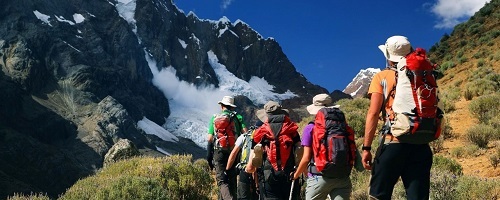
Measles cases are increasing worldwide
Before travelling, check that you and your family have received the recommended measles vaccinations.
Do not travel if you have symptoms of measles or have been in contact with someone with measles.
If you develop symptoms of measles after your return to Canada, call a health care provider right away.
Global Measles Notice
Services and information
Travel health information.
Learn about precautions you can take to enjoy a healthy stay outside Canada
Safety and security outside Canada
Find information about planning to travel safely outside Canada
Types of travellers
Find travel information specific to dual citizens, women, older people, 2SLGBTQI+ people and other types of travellers
What we are doing
Policies, acts and regulations.
- Department of Health Act
- Public Health Agency of Canada Act
- Quarantine Act
Publications
- Bon voyage, but… Essential information for Canadian travellers
- Travelling with children
- Well on Your Way – A Canadian's Guide to Healthy Travel Abroad
All related publications
- Recommended consent letter for children travelling abroad
- Registration of Canadians Abroad

Before travelling, check that you and your family have received the recommended measles vaccinations and know what symptoms to look out for.

Up-to-date information on and warnings about rapidly evolving health risks to Canadians travelling or living abroad.

Protect yourself from diseases spread by mosquitoes found in tropical climates.
Top Things to Do in Djibouti - Djibouti Must-See Attractions

Things to Do in Djibouti
Explore popular experiences, top attractions in djibouti.

What travelers are saying

Top Things to Do in Djibouti - Djibouti Must-See Attractions

Things to Do in Djibouti
Explore popular experiences, popular cities in djibouti.

Top Attractions in Djibouti

What travellers are saying


Entertainment
- GhanaWeb TV
- Home - Business
- Business Archive
- Business | TV
- Year In Review
- Business Headlines
- BizTech | TV
- Business Directory
- Bank Of Ghana
- Business & Financial Times
- BusinessGhana
- Citi Business News
- Ghana Stock Exchange
- Ghana Talks Business
- Budget - Archive
- Exchange Rate
- Stock Exchange (GSE)
Business News of Tuesday, 21 May 2024
Source: www.ghanaweb.com
I need 35 visas to travel across the continent - Africa's richest man 'cries'
« Prev
Next »
Comments (23)
Listen to Article

Africa's richest man - Aliko Dangote - says he needs 35 visas to travel in Africa on his Nigerian passport. A French passport has more visa-free access in Africa than Dangote pic.twitter.com/zuD7f1o3VH — Larry Madowo (@LarryMadowo) May 20, 2024
- Cut dollar rate from GH¢15.50 to GH¢10 or face massive demo in 2 weeks - Traders warn
- I will restore the cedi in 100 days - John Mahama
- Mahama behaving like he just landed from Mars - Bawumia on economic crisis comments
- We're checking our expenditure in this election year - Abena Osei-Asare
- Patronise made-in-Ghana products with pride – KT Hammond urges
- Read all related articles

Dr. Amoah, Alhassan Yakubu, 10 other GCB board members received $33,000 each for 'questionable overseas training' - Report

He didn't necessarily agree - Otto Addo details 'long' conversation with Dede Ayew over latest snub

This is a foolish statement - Bridget Otoo slams LilWin over the demise of 3-year-old boy

Cameroon replace coach Brys after Eto'o argument

Unpacking the False Equivalence: NDC and NPP are the same
- Advertising
- Privacy Policy

COMMENTS
12. MASSIGO TRAVEL. Friendly tour for sensational adventures in the hidden gem of Djibouti MASSIGO TRAVEL is one of the leading tourist agency operating in the supply of land and sea tourist excursions. Our specialty is hiking with nomads and camel salt caravan trekking.
Djibouti. Africa. This tiny speck of a country packs a big punch. What it lacks in size, it more than makes up for in beauty. Few countries in the world, with the possible exception of Iceland, offer such weird landscapes - think salt lakes, extinct volcanoes, sunken plains, limestone chimneys belching out puffs of steam, basaltic plateaus ...
See full details. See ways to experience (2) 2. Lake Abbe. 50. Bodies of Water. You can only reach Lac Abbé by 4WD, and you'll need to hire a guide and set aside two days to do it. In the far south-west of the country on the border with Ethiopia, Lac Abbé is the dawn gathering place for flamingoes.
The sunsets from Khor Ambado are some of the best in the country. If you're looking to relax and unwind for a couple of days of sand and surf, you can't go wrong here. 9. Tropical Aquarium. Source: vkilikov / shutterstock. Tropical Aquarium Djibouti. This is one of the country's top tourist draws.
Djibouti, Djibouti. Nestled on the southern tip of the Gulf of Tadjoura, the seaside capital of Djibouti is a modest harbor town and a major port of trade and travel via Ethiopia and other points in Africa, especially as the terminus for the Djibouti-Addis Ababa Railway. Beaches along the eastern shore provide some respite from the blistering ...
Djibouti City. In a street running parallel to Blvd de la République, this Orthodox church, which is popular with the Ethiopian community, is well worth a peek. South Africa. Morocco. Kenya. Tanzania. Egypt. Discover the best attractions in Djibouti including Abourma Rock Art Site, Decan, and Les Allols.
This is the shady center of town, home to the tourist office and some other buildings. See full details. 8. Hamoudi Mosque. 20. Religious Sites. By EdinKrnic. Very traditional mosque in center of Djibouti. Old style and unique Arab architecture in this area.
1. Lake Assal. 223. Bodies of Water. Lac Assal is 150m (492ft) below sea level, and is an aquatic wilderness surrounded by dormant volcanoes and black lava fields. The lake is a one-day trip on the tarmac road west from the capital. …. See ways to experience (2) 2. Khor Ambado Beach.
Tourist information [edit] National Tourism Office of Djibouti; Get in [edit] A map showing the visa requirements of Djibouti, with countries in lime having visa on arrival Visa requirements [edit] Most nationals can get a visa on arrival for 15,000 DJF or 90 USD (as of November 2018), valid for one month.
Djibouti's climate is hot all year round, with temperatures in Djibouti City rarely falling below 68°F/ 20°C even in winter (December - February). Along the coast and in the north, the winter months can also be quite humid. In summer (June - August), temperatures often exceed 104°F/ 40°C, and visibility is reduced by the khamsin, a dust ...
Djibouti's central square, Place Menelik, is located here. Place Menelik, Djibouti's most popular tourist attraction, is a peaceful place to visit during the daytime hours. Place Menelik, which is a historical attraction during the day, changes into a nightlife hotspot after dark.
Tourism in Djibouti. Tourism in Djibouti is one of the growing economic sectors of the country and is an industry that generates 53,000 and 73,000 arrivals per year, with its favorable beaches and climate and also including islands and beaches in the Gulf of Tadjoura and the Bab al-Mandab. [1] The main tourist activities are scuba diving ...
Day 4: Moucha Island. Djibouti is a tiny country with a relatively large coast and a few offshore islands. Diving is possible and you can see whale sharks during the season. But there are also a few islands, the most popular of which is Moucha Island, an easy day trip from the capital city. Fishermen port.
Djibouti City has some pretty unique architecture. Being a former French colony, Djibouti City has preserved some stunning buildings that reflect the French architectural style. You'll be amazed at how the landscape quickly changes as you move from downtown near the nation's assembly to Heron, or from Harmouss to Quartier 7, for instance ...
Friendly tour for sensational adventures in the hidden gem of Djibouti MASSIGO TRAVEL is one of the leading tourist agency operating in the supply of land and sea tourist excursions. Our specialty is hiking with nomads and camel salt caravan trekking. Whether in a group, as a family, on a budgetary basis, our services in the organization of ...
When to visit Djibouti - is in the winter months (December - February) when temperatures are at their coolest and sunshine is plentiful. If you want to swim with Djibouti's famous whale sharks, travel between October and February. Get to Djibout & Go. Getting Djibouti there by air: Ambouli airport is located approximately 5 km south of town.
Moucha island you do on a day, boattrip to there is nice, dolphins on the way. Dont expect any choises of meals on the... 7. Place Menelik. 100. Points of Interest & Landmarks. This is the shady center of town, home to the tourist office and some other buildings. See full details. 8.
A travel guide to Djibouti City - Sight of the architecture found at European Quarter. INSIDE INFO: While luxury hotels like Kempinski or Sheraton are located in the district of Heron, I found the European Quarter as the best area to find inexpensive and nice accommodation.Furthermore, take into consideration that many hotels will ask for a certificate of marriage if you are planning to stay ...
Reissued with obsolete COVID-19 page links removed. Exercise increased caution in Djibouti due to terrorism and crime.. Terrorists may attack with little or no warning, targeting tourist locations, transportation hubs, markets, shopping malls, government facilities, hotels, clubs, restaurants, places of worship, parks, major sporting and cultural events, educational institutions, airports ...
Djibouti Tourism: Tripadvisor has 4,741 reviews of Djibouti Hotels, Attractions, and Restaurants making it your best Djibouti resource.
New York City. See Guide. National Geographic's latest travel stories about Djibouti.
What To Know About Visiting Djibouti. Visitors can get an eVisa in advance (the system was introduced in 2018). Visitors are required to have an onward ticket, and the visas are good for a 31-day ...
Explore Djibouti, Djibouti: See reviews, articles, and photos of Explore Djibouti, ranked No.10 on Tripadvisor among 10 attractions in Djibouti.
The answer is yes, you can use the Revolut card for everyday spending in Djibouti. You can use the card to pay for things in Djiboutian Francs with competitive exchange rates and low transaction fees. This guide walks through how you'll be able to use your Revolut card to help manage your travel spending. Learn more about the Revolut card.
Travel health notices. Up-to-date information on and warnings about rapidly evolving health risks to Canadians travelling or living abroad. Prevent mosquito bites while travelling. Protect yourself from diseases spread by mosquitoes found in tropical climates. Date modified: 2024-03-28. Government of Canada's official one-stop-shop for ...
the residence permit is at least 3 months old and valid for at least another 3 months when entering Bahrain; and. having a re-entry visa issued by the country of residency; and. having a hotel reservation confirmation; and. having a return/onward ticket for next destination and sufficient funds to cover their stay.
In accordance with Article III of the Jeddah Convention, The Regional Organization for the Conservation of the Environment of the Red Sea and Gulf of Aden - PERSGA was established in 1995. C. Organizational structure. Contracting Parties - The following are the parties of the Jeddah Convention: Djibouti, Egypt, Jordan, Saudi Arabia, Somalia ...
12. MASSIGO TRAVEL. 28. City Tours. Friendly tour for sensational adventures in the hidden gem of Djibouti MASSIGO TRAVEL is one of the leading tourist agency operating in the supply of land and sea tourist excursions. Our specialty is hiking with nomads and camel salt caravan trekking.
Things to Do in Djibouti, Africa: See Tripadvisor's 4,741 traveller reviews and photos of Djibouti tourist attractions. Find what to do today, this weekend or in June. We have reviews of the best places to see in Djibouti. Visit top-rated & must-see attractions.
Business News of Tuesday, 21 May 2024. Source: www.ghanaweb.com 2024-05-21 I need 35 visas to travel across the continent - Africa's richest man 'cries'